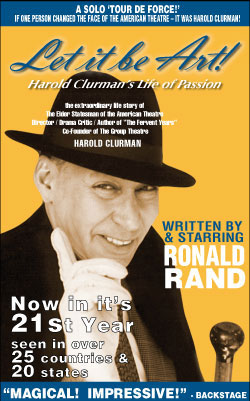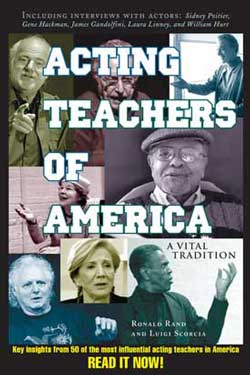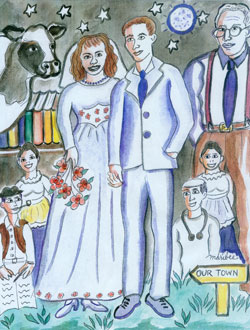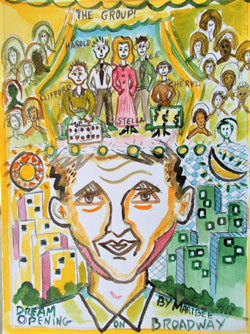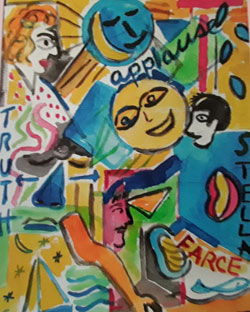Spotlight On
International Artists
Zana Marjanovic, Dr. Ashley William Joseph,
M. Safeer, Kevin Kimani Kahuro, Ilire Vinca,
Avra Sidiropoulou, Sujatha Balakrishnan,
Mihaela Dragan, Farah Deen, Katy Lipson,
Juan Maldonado, Odile Gakire Katese,
Hartmut von Lieres, Dragan Jovicic,
Sachin Gupta, Jill Navarre
~~~~~~~~~~~~~~~~~~~~~~~~~~~~~~
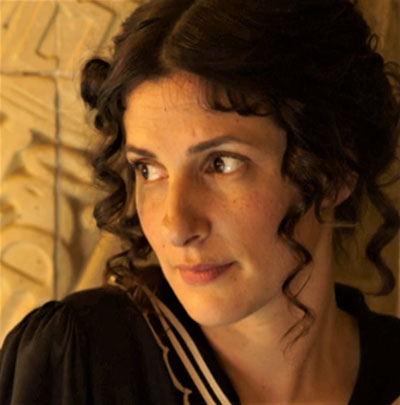
Zana Marjanovic
is currently performing in Murray Schisgal’s hit comedy hit comedy “LUV,” directed by Ronald Rand, opposite Moamer Kasumović and Muhamed Hadzovic to sold-out audiences for over five years at Sarajevo’s famed Chamber 55 Theatre in Bosnia & Herzegovina. The award-winning production has traveled to Croatia, Serbia and Montenegro. Ms. Marjanovic has received acclaim for her performance in Aida Begic's “Snow,” Cannes’ Critic's Week Grand Prize winner. Her film and television roles include playing the lead in Angelina Jolie's directorial debut, Golden Globe-nominated “In the Land of Blood and Honey,” BBC’s “Broken” with Tim Roth and Cillian Murphy, which received British Independent Film Awards’ Best Film Award, “The Game,” “Legends,” and “A Rose in Winter” opposite Christian Cooke.
What gives you your greatest joy being an actress?
My greatest joy being an actress is that I get to do the shows I do all over again. I get to live a life I may have been curious about, or a life I hadn't known existed. I meet people, generally women, of different background, nature, career, class, habits, different aspirations and attitudes. I learn about history, art, music, philosophy, religion...
It’s the greatest experience for me, to learn about a character someone has created or a person that lived and bring her to life.
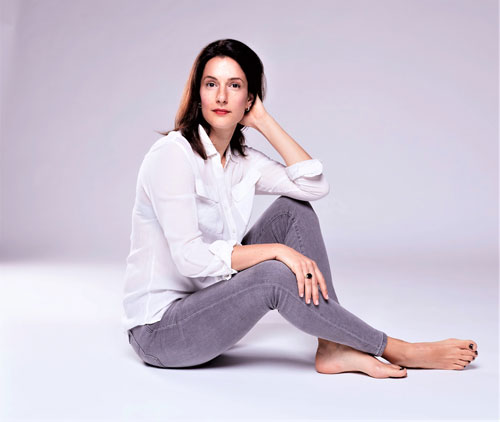
Did you always know you wanted to be in the theater?
I think I did. For as long as I can remember, acting's been my passion. I did other things in life. I even studied law for a short while, but whatever I did, I always came back to acting, to theatre. I love the smell of the theatre, its darkness, backstage, hallways, sounds, people that work there – the magic.
How did your studying acting at Sarajevo’s Academy of Dramatic Arts prepare you for your career?
Zana Marjanovic performing in her nightclub act
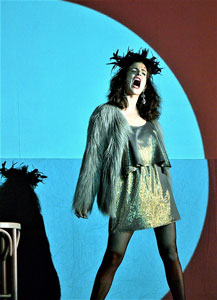 The Academy had developed a system in the 1980’s based on Stanislavsky’s System of Acting but upgraded with teachings by a local professor and a very famous, regional director. Though quite traditional in its approach to theatre, it offered a great set of skills, while insisting on theoretical knowledge.
The Academy had developed a system in the 1980’s based on Stanislavsky’s System of Acting but upgraded with teachings by a local professor and a very famous, regional director. Though quite traditional in its approach to theatre, it offered a great set of skills, while insisting on theoretical knowledge.
One important thing that prepared me for my career is that it taught me how to use my own mind, so to speak. Actors often rely on a director and the writer to create their character, but there is so much more to a living person than what’s written in the script or what is said about him/her by other characters. I learned how to be creative even when it seemed there’s no room for it.
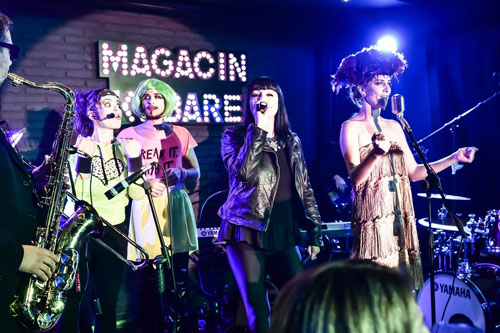
Zana Marjanovic performing in her nightclub act
You’ve been performing every month for over five years in the hit comedy, “LUV,” one of the greatest comedies ever written, at Chamber Theatre 55 in Sarajevo opposite two gifted actors. What keeps the experience staying fresh for you playing Ellen Manville?
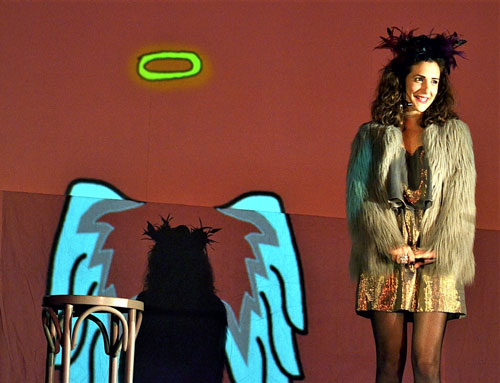
Zana Marjanovic performing in her nightclub act
My partners and the direction. The way that the director, Ronald Rand, directed the play allows us to walk down a familiar path every performance, but at the same time he gave us space to create anew each time.
And if I didn’t have such amazing partners, it would have been a tiresome experience playing the same thing over and over again. Each time we perform, there is always something new we discover about our characters, about their relationship, their dynamic. Every new audience brings something new, so we believe we will keep playing “LUV” for a long, long time.
What are some of the secrets you’ve discovered about comedy from your performing in nightclubs, and in “LUV” over several years?
I believe comedy to be the hardest of all genres. The indicators of how well you did are immediate and transparent - people either laugh or they don’t. However, if you think about this while you’re performing, your chances of being successful are very low.
I don’t think I’ve discovered anything revolutionary about comedy, but what works for me is figuring out the right comedic timing - the rhythm, tempo and pauses while being completely relaxed and confident to enhance humor. This tends to be difficult for you want to be precise, which means you are focused and calculated. But in order to be relaxed, I learned, you just have to practice enough. It’s as simple as that.
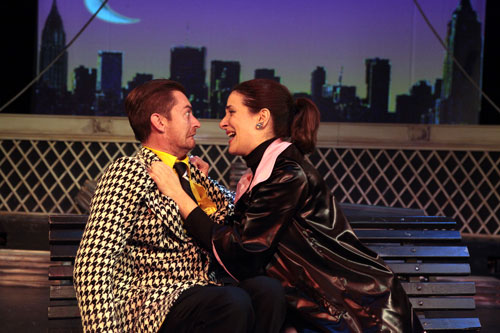
In Murray Schisgal’s comedy, “LUV,” directed by Ronald Rand, at Sarajevo’s Chamber Theatre 55
You are a member of the famous Chamber Theatre 55 in Sarajevo performing in several productions. What has that meant to your growth as an actress?
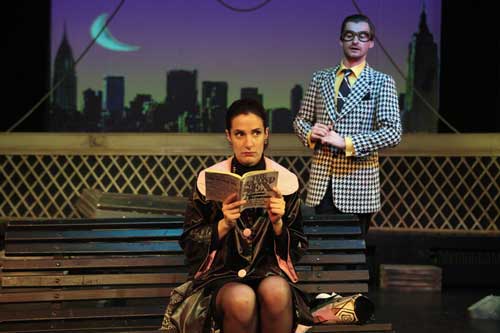
In Murray Schisgal’s comedy, “LUV,” directed by Ronald Rand, at Sarajevo’s Chamber Theatre 55
I work a lot on film and television. So, it’s very important for me to keep in touch with where I started, with live performance, with people, with classics. All knowledge I possess, and all the skill I've acquired as an actress, comes from my work in the theatre, specifically from acting at Chamber Theatre 55. The ensemble is like my family, so I feel safe to try new things, to make a mistake. It’s a place where I move forward and excel.
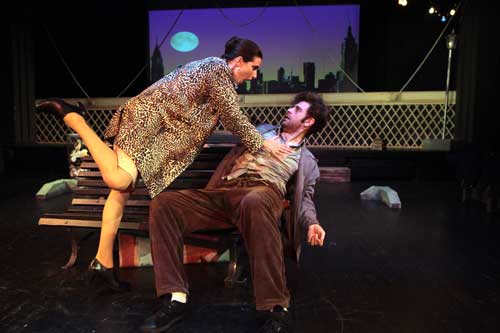
In Murray Schisgal’s comedy, “LUV,” directed by Ronald Rand, at Sarajevo’s Chamber Theatre 55
You also starred in Angelina Jolie’s debut film, “In the Land of Blood and Honey.” What did it mean to you to work on this film, and with Ms. Jolie as your director?
 This film marked my life for various reasons. Firstly, because it was a film about my country, the devastation the 1990’s war has brought to Bosnia and Herzegovina. It spoke the truth about sexual abuse in the conflict and what happens to women during the war in a very open and honest way.
This film marked my life for various reasons. Firstly, because it was a film about my country, the devastation the 1990’s war has brought to Bosnia and Herzegovina. It spoke the truth about sexual abuse in the conflict and what happens to women during the war in a very open and honest way.
At the same time, it was incredibly important to me, and Ms. Jolie, that we portray women victims of war as truthfully as possible and give them the dignity they deserve, because these women are alive and will come to see the film. We wanted to do this in their honor, to amplify their voices seldom heard.
Secondly, it has marked the beginning of my international career. Many new doors were opened. I auditioned and worked with many amazing directors and actors across the globe.
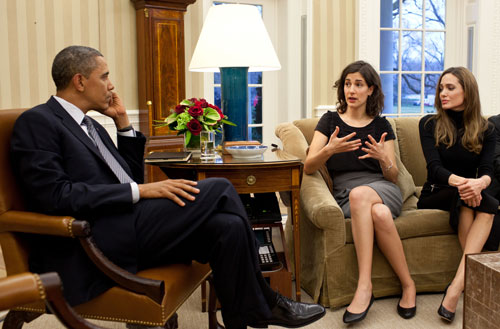
Zana Marjanovic at The White House, Washington, D.C. in the Oval Office with President Obama and Angelina Jolie(photo 2a, 10)
Your country has a rich history in theater and all the arts. How do you feel the plays you continue to be a part of contribute to the well-being and life of its people?
During the siege in 1993, which lasted a thousand, four hundred and twenty-five days, Sarajevo has defended itself with culture as well. Over three thousand art works were produced, forty-eight concerts, and more than a hundred and seventy exhibitions. There were a hundred and eighty-two theatre premieres that were attended by more than half a million citizens of Sarajevo. So, yes, plays have and will continue to contribute to our society as a tool of empowerment, reflection and survival.
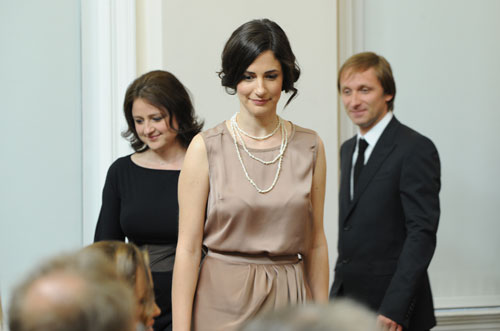
Zana Marjanovic, Vanessa Glodjo and Goran Kostic at the launch of the UK initiative on preventing sexual violence in conflict, 2012 (photo: Foreign and Commonwealth Office
~~~~~~~~~~~~~~~~~~~~~~~~~~~~~~
Dr. Ashley William Joseph
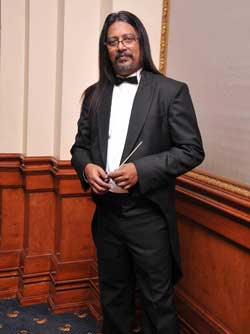 Is the Founder and Director of the William Joseph International Academy for Performing Arts, Chairman of the William Joseph Music Foundation, Director and Conductor of the 100-year-old Bangalore Musical Association, and Founder Director and Conductor of the Indian National Symphony Orchestra. His parents, Maestro Joseph Thomas Williams and Mrs. Sarah William Joseph encouraged him early in music. Maestro J.T. Williams was the Chief Pipe Organist at St. Andrew's Church in Bangalore, Head of the Music Department at Baldwin Boys High School in Bangalore. Dr. Williams was selected in 1985 under scholarship to pursue his professional studies of music in Manila, Philippines, specializing in conducting, voice, piano, guitar, organ, and ethnomusicology . He also performed with the Philippine Philharmonic Orchestra , the Philippine Madrigal Singers and the Asian Chorale, receiving a Doctorate in Music from the Trinity Open University. Dr. Williams was the only Indian to perform with the Asian Chorale during their tour of Sweden where they performed for the King and Queen. He has also performed as a soloist in the United Kingdom with the Liverpool Male Voice Ensemble. He has re-written Western music notation into Indian music notation to enable and encourage Indian musicians to be a part of the Global YouTube Symphony Orchestra. He also re-arranged ancient Kannada ethnic songs into a modern form for the young listener. Dr. Williams is on the Board of Directors of the Trinity School of Music. His compositional music received the first prize on All India Radio. Dr. Williams was honored by The YMCA of Singapore and the International Y's Men's Club of Singapore, through a joint project in aid of the Thailand flood victims, for his performance with the Thailand Sanctuary Symphony Orchestra as Guest Conductor. Dr. Williams also received the Messenger of Peace Award from the International Cultural Development and Exchange group and the ICYE Germany. He was honored for his performance in Malaysia for a charity concert to raise funds for street children. An inspiring teacher, Indian opera star, Deepika Padukone, and 2011 Miss Earth Nicole Faria were both trained by Dr. Williams. Over the years, Dr. Williams has directed and produced many musicals in India, including My Fair Lady, Man from La Mancha, Oliver Twist, Sound of Music, Fiddler on the Roof, Jungle Book, Annie, Sleeping Beauty, Cinderella, and Snow White. Dr. Williams has taught music in well-known schools, and headed the musical, literary, and cultural departments in various institutions.
Is the Founder and Director of the William Joseph International Academy for Performing Arts, Chairman of the William Joseph Music Foundation, Director and Conductor of the 100-year-old Bangalore Musical Association, and Founder Director and Conductor of the Indian National Symphony Orchestra. His parents, Maestro Joseph Thomas Williams and Mrs. Sarah William Joseph encouraged him early in music. Maestro J.T. Williams was the Chief Pipe Organist at St. Andrew's Church in Bangalore, Head of the Music Department at Baldwin Boys High School in Bangalore. Dr. Williams was selected in 1985 under scholarship to pursue his professional studies of music in Manila, Philippines, specializing in conducting, voice, piano, guitar, organ, and ethnomusicology . He also performed with the Philippine Philharmonic Orchestra , the Philippine Madrigal Singers and the Asian Chorale, receiving a Doctorate in Music from the Trinity Open University. Dr. Williams was the only Indian to perform with the Asian Chorale during their tour of Sweden where they performed for the King and Queen. He has also performed as a soloist in the United Kingdom with the Liverpool Male Voice Ensemble. He has re-written Western music notation into Indian music notation to enable and encourage Indian musicians to be a part of the Global YouTube Symphony Orchestra. He also re-arranged ancient Kannada ethnic songs into a modern form for the young listener. Dr. Williams is on the Board of Directors of the Trinity School of Music. His compositional music received the first prize on All India Radio. Dr. Williams was honored by The YMCA of Singapore and the International Y's Men's Club of Singapore, through a joint project in aid of the Thailand flood victims, for his performance with the Thailand Sanctuary Symphony Orchestra as Guest Conductor. Dr. Williams also received the Messenger of Peace Award from the International Cultural Development and Exchange group and the ICYE Germany. He was honored for his performance in Malaysia for a charity concert to raise funds for street children. An inspiring teacher, Indian opera star, Deepika Padukone, and 2011 Miss Earth Nicole Faria were both trained by Dr. Williams. Over the years, Dr. Williams has directed and produced many musicals in India, including My Fair Lady, Man from La Mancha, Oliver Twist, Sound of Music, Fiddler on the Roof, Jungle Book, Annie, Sleeping Beauty, Cinderella, and Snow White. Dr. Williams has taught music in well-known schools, and headed the musical, literary, and cultural departments in various institutions.
How young were you when you discovered music meant so much to you?
Music has always been a part of my life from early childhood, coming from three generations of musicians. I guess that music has all along been in my blood. When all students were busy learning math and science, my mind was playing symphonies all the time. From an early age, I studied various instruments. What fascinated me most at an early age was the symphonic sounds of the opera and musicals.
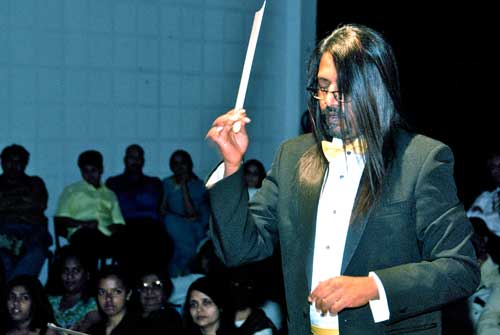
Dr. Ashley William Joseph leading the Indian National Symphony Orchestra
You studied in Manila, specializing in conducting, voice, piano, guitar, organ, studying the sitar and ethnomusicology, and went on to perform with the Philippine Philharmonic Orchestra, the Philippine Madrigal Singers and the Asian Chorale, receiving a Doctorate in Music by the Trinity University. Did you know at that time your path was leading you to become a conductor?
Conducting has always been prime focus. I grew up watching my father conducing orchestras and chorales. Having studied conducting, I always consider it an art, especially the passion and warmth of a conductor reflects in their music performance.
Yes, I have always wanted to be a conductor of both Chorale, orchestral and Opera works. Further on with my studies in the Philippines under some of the great conductors, Dr. Feliciano and Ricardo Mazo Jr, they honed my skills as a conductor. I have always believed that the conductor is the soul of any musical performance. Unfortunately, here in India, we do not have too many trained conductors, I wish there was.

Dr. Ashley William Joseph leading the Indian National Symphony Orchestra
You are the Director and Conductor of the 100-year-old Bangalore Musical Association, producing yearly classical concerts of serious Choral music, and the Director and Conductor of the Orchestra. What kind of a preparation do you go through for a concert and how do you maintain your energies as a strong conductor?
Preparations are always varied depending upon the type of music we perform. In the past in India, we had difficulty getting orchestral scores, so a lot of my time and energies went into listening to recordings on LP's and cassette tapes and then hand-writing each part for the orchestra. The process was long and difficult, but I enjoyed seeing the music score unfold on hand-written sheets of music.
As a conductor and director, I also have to train both the singers and orchestral musicians. After all, the hard work done to maintain my energies on stage was not difficult as I looked at our concerts as a blank canvas unfolding on stage. The beauty of the music is when it touches the ‘soul strings’ of my audience.
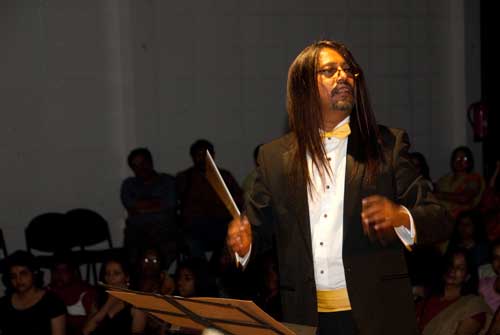
Dr. Ashley William Joseph leading the Indian National Symphony Orchestra
Why is it important to you to create awareness through music and inspire new generations of music lovers in India and abroad?
India, firstly, has a very rich tradition of the performing arts. Some of our best musicians left the country to study. It was my aim after I did, to come back to India and spread the knowledge that I gained from all my music studies and performances.
With the influx of the modern internet age, music teaching has gone astray, electronic music has become the norm. I find instrumentalists who rely on their electronic gadget to produce a sound.
I have always taught my students music as a whole, and music as an art. The new generations across the world need good music.
To me, music is the soul of any human being. The most important thing for us to create awareness to help with funding music, which is lacking in our country. Funding for the Symphony Orchestra has almost come to a stand-still, but I do not give up taking this dream forward.
You have great enthusiasm for wanting to present the World Premiere and conducting Hartmut von Lieres’ and Ronald Rand’s new opera, “IBSEN” in India, which would be the first full-length opera to be performed in Bangalore in over 30 years. Why do you feel Ibsen’s powerful ideas continue to speak to the people of India, and what would it mean for this opera to come to the community of Bangalore and India, and then tour to Malaysia, Thailand and the Philippines?
Firstly, a big thank you to Ronald and Hartmut for giving me to opportunity to lead the World Premiere of their beautiful new opera, “IBSEN.” What brought me to take this on was the beautiful script and the ever-so-haunting musical score.
Yes, Bangalore has not seen an opera in over thirty years, the last opera was done by my late father Maestro J.T. William Joseph. Having read Ibsen's beautiful and deep poems and plays, I consider him as the father of modern playwrights and theatre. Most of Ibsen’s works talk about the frustrations and insecurities of people and life; is this not true even today, no matter where technology has taken us.
I believe that this beautifully written opera will re-ignite the hearts and souls of theater-goers in Bangalore and across Asia, and bring to life this great work of Ronald and Hartmut. I do hope that the opera, “IBSEN.” will have a younger audience as they are the future to the arts and its performances.

You are also a gifted teacher. Indian film star, Deepika Padukone, and 2011 Miss Earth, Nicole Faria, are two of your many students. Why is teaching so important to you? What do you learn from teaching and communicating the deep insight of great music?
Teaching to me is a passion not a profession, having taught for over three decades. I still believe that one can always learn from their students. Teaching the performing arts has been like life's journey itself. To see my students as superstars is the greatest gift that I have received.
The problem India is facing today is the dearth for quality of good music teachers who can ignite the passions of students. Deepika's last performance with me was “Fiddler on the Roof” and Nicole Faria who has the most beautiful voice her last performance with me was in “Orphan Annie.”
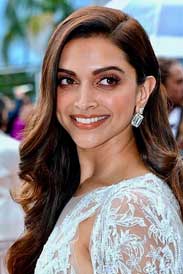 |
 |
| Deepika Padukone, former student of Dr. Ashley William Joseph | Nicole Faria, former student of Dr. Ashley William Joseph |
What do you think the force of great music continues to have on the life and soul of the people of this planet?
Dr. Ashley William Joseph playing at a special Memorial service
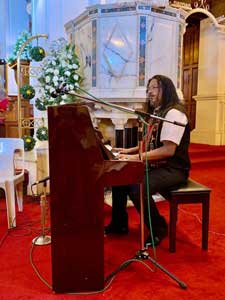
As I have always said, ‘music is the soul of any human being or living thing.’ I only wish that people to return to music that was written with soul, and not an electronic gadget. The internet and electronic age certainly have brought good, but also a lot of the opposite since today as human beings we rely too much on the internet for everything.
I hope that live performance can bring back the soul of music to the modern generation. Great music cultivates harmony of cultures and people, music is the only universal language that we the people of this planet speak.
~~~~~~~~~~~~~~~~~~~~~~~~~~~~~~
M. Safeer
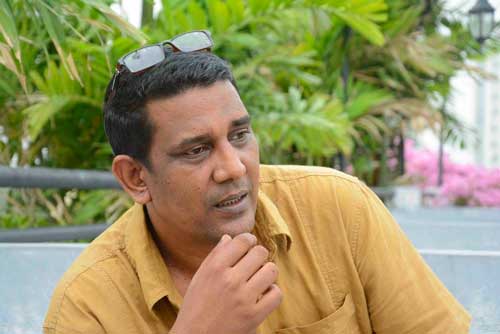
Is an award-winning Theater Director, Artistic Director of Inter Act Art Theatre in Colombo, Sir Lanka, playwright, publisher, author, and Founder and Organizer of the Colombo International Festival Director, the first international theater festival in Sri Lanka. Safeer introduced the black box theater concept to Sri Lanka. He has directed and written over thirty dramatic works including plays, one-acts, ballets, in their original language, translations as well as bi-lingual adaptations, contributing to the enhancement of Sinhala Theatre, including directing a new play at FLAME (Foundation for Liberal Arts and Management Education) University in Pune, India, with the university students and conducting a workshop on ‘Movement Theatre.’ He has also produced three non-verbal solo plays with actors in Goa, India, on the invitation of the directorate of Culture and Arts. Safeer created his own adaptation of “The Diary of Anne Frank,” and presented and directed performances at the Goethe Institute in Colombo.. Safeer has been a judge at the National Theatre Festival, and other theatre festivals organized by the Ministry of Education. He has been an instructor in training performing art teachers of the ministry, and in developing Sinhala, Tamil and Muslim Youth Island across Sri Lanka. An executive committee member of the National Federation of Theater Artists in Sri Lanka (NFTAS), Safeer is the author of several books including the first book on Stage Management, and on the Black Box Theater in Sinhala.

What led you to create the Colombo International Theatre Festival in Sri Lanka?
Between 2008 and 2010, I had the opportunity to attend some international theater festivals, seminars and conferences in various countries. The people I met at these occasions would ask me, “How many theater festivals do you have in Sri Lanka?” It was a very embarrassing question to answer, as we had none.
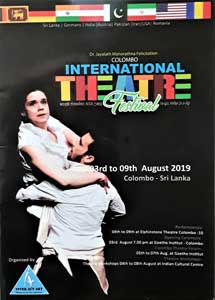 So, in 2011, I decided, together with members of my Inter Act Art Theatre group, we began to think about organizing an International Theater Festival for Sri Lanka. At that time, we never thought of the magnitude of the task we were undertaking. Now for the last eight years we have managed to run this festival continuously, without support from the government.
So, in 2011, I decided, together with members of my Inter Act Art Theatre group, we began to think about organizing an International Theater Festival for Sri Lanka. At that time, we never thought of the magnitude of the task we were undertaking. Now for the last eight years we have managed to run this festival continuously, without support from the government.
As a dramatist and a Sri Lankan, I feel happy and victorious at this moment being able to have organized the Colombo International Theatre Festival, even in the midst of so many complications, with a great team. Another achievement was being able to felicitate veteran Sri Lankan theater personality Dr. Jayalath Manorathne to help us over the past five years.
Culture is an important factor among the criteria used in measuring development of a country. The Colombo International Theatre Festival is a good opportunity to accomplish it.
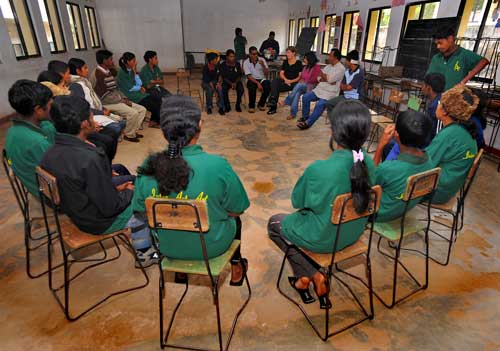
Inter Art Act Theatre Workshop
When authorities of many countries had warned their citizens about the risks involved in going to Sri Lanka, we are proud of those who came, including your coming to Colombo, and bringing your excellent one person play, “LET IT BE ART!” to be in the Festival. I also salute all the teams and all our partners for trusting us.
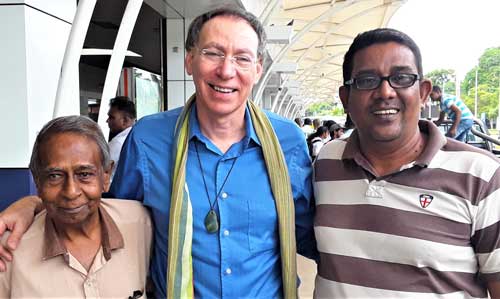
(L. to R.) Jayalath S. Gomes, Festival Secretary of The Colombo International Theatre Festival, Ronald Rand, M. Safeer
As a theater leader in Sri Lanka, what has been your greatest hope with the Festival and the productions you create with Inter Art Act Theatre, that will say to the people of Sri Lanka?
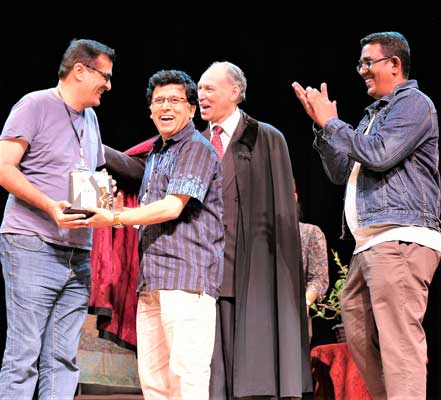
M. Safeer on stage at the Colombo International Theatre Festival with Ronald Rand as Dr. Asish Goswami presents the Festival Award to Aamir Nawaz, Director of the Pakistan production of “Book of Love” after their performance at the Festival, 2019
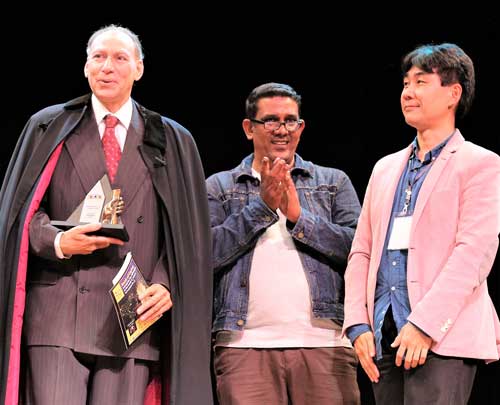
M. Safeer on stage with Ronald Rand receiving the Colombo Festival Award from Kakumoto Atsushi, after Rand’s performance in Colombo International Theatre Festival, 2019
The feedback from this year's performances are that the Sri Lankan audiences who love the theater have gained more knowledge of the present global theater, learning more about the modern trends and the latest technologies. I hope this positive atmosphere will spread by the word of mouth and help to increase the audience for next year’s Festival and for all our productions, including the adaptation I created from “The Diary of Anne Frank.”
When I first started acting, directing and producing dramas, and founded Inter Act Art performing arts group in 1990, I saw how drama could address a social issue without judgment or condemnation.

M. Safeer with Director, Sachithra Rahubadda, Jayalath S. Gomes, Kakumoto Atsushi, Participants and Honored Guests at the Colombo International Theatre Festival, 2019
Were you pleased with the response to the recent Colombo International Theatre Festival, and what do you continue learning to make it even better each year?
Yes, out of the last eight festivals held so far, 2019 was the most successful. Theater in Sri Lanka lost its image and its popularity from mid-1990’s. It's not a profitable industry and theater makers do it for their self-satisfaction. The state support for theatre is also minimum. But now the people have come to know of the Colombo International Theatre Festival and its value.
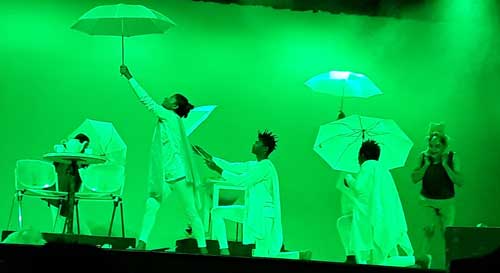
M. Safeer’s play, “Kevin,” performed at the Colombo International Theatre Festival, 2019
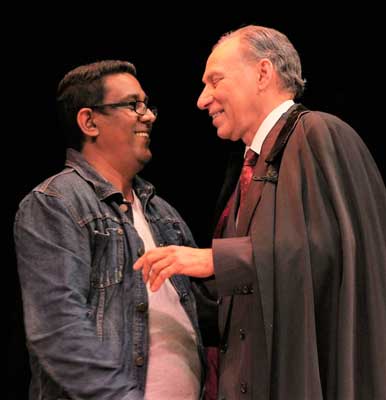
Ronald Rand with M. Safeer onstage of the Elphistone Theatre after Rand’s performance in his play, “LET IT BE ART!” at the Colombo International Theatre Festival, 2019
I think that the workshops conducted by the international performers like yourself were very popular among the young students and actors of Sri Lanka who came and participated. The demand for participation in these workshops among university students and young practitioners have improved over the years which is good sign for future of the Sri Lankan Theatre.
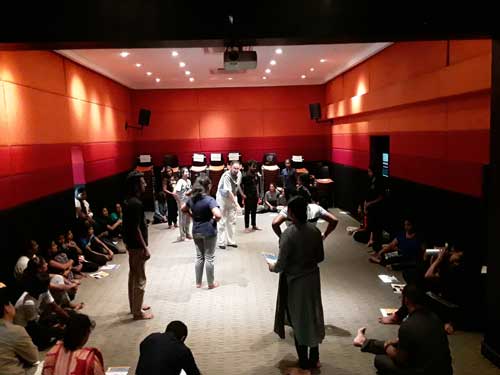
International Performing Artist Ronald Rand conducting his Master Acting Workshop, “Art of Transformation” at the Colombo International Theatre Festival, 2019
In my opinion what has to be improved are the different forums, including the Director's Forum. We need to persuade the local directors to get more involved so they can join with us and share their knowledge to help all those who come more about the present global theatre.
Sri Lanka is lucky to have an inspiring theater practitioner as yourself, with your talents as a gifted writer, director, publisher, and author that you share in so many ways.
I don’t know whether I have all those traits you have said. But as a theatre person, I am not bent of making theater alone. My intentions are to provide facilities and support those who wish to develop themselves in the field of theatre, in whatever way I can.
To share knowledge and guide the young people to be stronger talents for the theater for a better Sri Lankan Theatre. To be ambitious and to experiment with novel ideas, technologies and trends without fear or shame.
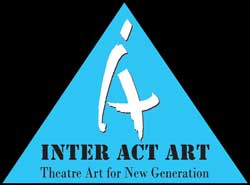
~~~~~~~~~~~~~~~~~~~~~~~~~~~~~~
Kevin Kimani Kahuro
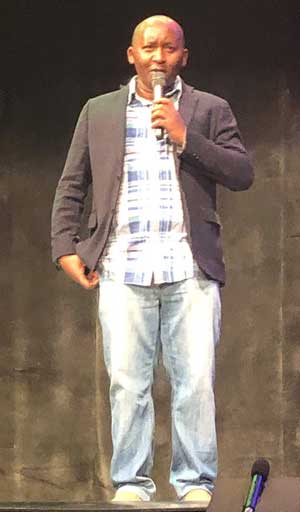 Founder and Festival Director of the Kenya International Theatre Festival in Nairobi, Kenya with Organizer Gabriel Thuku bringing together local and international theatre troupes across Kenya in Nairobi, Nakuru and Mombasa. Mr. Kahuro is the Principal, Nairobi Institute of Music and Performing Arts (NIMPA). A member of The Art Society of Kenya (TASK) and a founding member of Theatre Arts Practitioners Society of Kenya (TAPS). He has previously worked for Glamourous Entertainment and 25th Century Production House as the Managing Director. He has also produced theatrical production at Kenyatta University and is the founder of Kenyatta University Drama Club and has produced plays for many high schools at the Kenya National Drama Festival.
Founder and Festival Director of the Kenya International Theatre Festival in Nairobi, Kenya with Organizer Gabriel Thuku bringing together local and international theatre troupes across Kenya in Nairobi, Nakuru and Mombasa. Mr. Kahuro is the Principal, Nairobi Institute of Music and Performing Arts (NIMPA). A member of The Art Society of Kenya (TASK) and a founding member of Theatre Arts Practitioners Society of Kenya (TAPS). He has previously worked for Glamourous Entertainment and 25th Century Production House as the Managing Director. He has also produced theatrical production at Kenyatta University and is the founder of Kenyatta University Drama Club and has produced plays for many high schools at the Kenya National Drama Festival.
What first attracted you to the theater and when do you first experience theater performances?
What attracted me was my love for acting and wanting to use myself as an actor – my tools, my voice, body and imagination to express myself and to tell stories.
I first visited the theater when I was in high school; I must have been seventeen or eighteen years old. I knew immediately that being in the theater was what I wanted to do. Nine months later I went and joined a theater and started as an actor. After that I went to study theater at the university and received a Bachelors’ Degree, and a Masters’ Degree in Theater Arts.
Are there certain theater practitioners who meant a great deal in your work?
For me, certainly there have influences on my growth, and for me, two of the most influential directors would be first, Constantin Stanislavsky. He has stood out as the most influential actor/director, as well as Harold Clurman. I heard about them and studied their way of working, how they expressed their techniques as directors, when I was studying at the university about acting, directors and the theater.
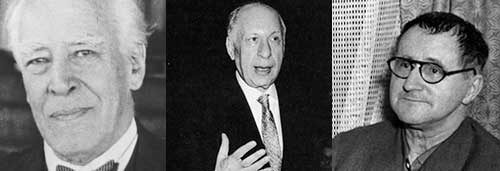
Constantin Stanislavski, Harold Clurman, Bertolt Brecht
Also, Bertolt Brecht and his ideas, and the way he worked in the German theater. All of their achievements and the legacy in their works. I studied Stanislavsky’s way of working with the actor in the Moscow Art Theatre, and Clurman’s freedom to allow the actor to use their imagination to express themselves in the productions in The Group Theatre.
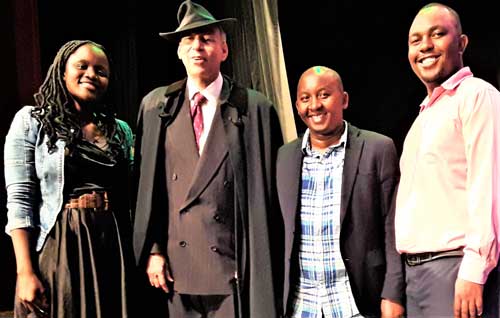
After a performance of Ronald Rand’s solo play, “LET IT BE ART!” at The Kenya International Theatre Festival, 2019
Why did you decide to start The Kenya International Theater Festival?
In Kenya, we have a very large festival for schools and colleges, where new works which have been created are performed and new modern dances. At this festival is where I began. I was very passionate during my high school days and explored the festival. In 2011, I had the opportunity to have several performances in the Festival, and in 2012, I won several of the awards.
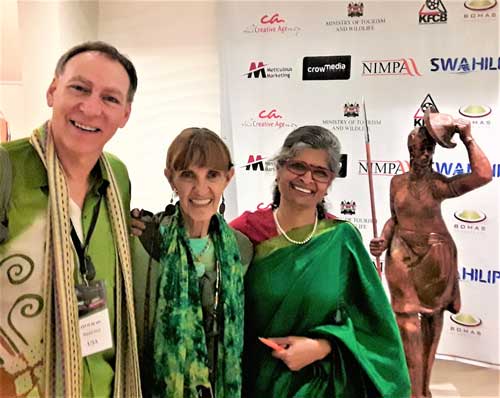
At The Kenya International Festival, 2019 (L.-R. Ronald Rand, Margaretta wa Gacheru, Sujatha Balakrishnan)
We were going to prepare for the next festival, but in 2013, I felt then I needed to be a bigger platform at the University to bring together more people with more ideas and more educational techniques and more issues from theater actors and directors. To provide opportunities for more people of Kenya to do more performances and to showcase their talents.
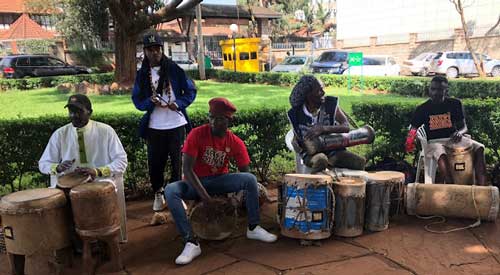
At the Cultural Centre, Nairobi before the Opening of The Kenya International Theatre Festival, 2019
That was when I had the idea of The Kenya International Theater Festival. In 2016, we did the first Theater Festival, and we had performances from Ethiopia and from across Kenya. And with time it has grown. In 2017, we had two international theater groups from Uganda and South Africa, as well as Kenya.
In 2018, there was great improvement, with performances from Sweden Canada, Egypt, South Africa, Uganda and Kenya. It progressed to the 2019 Edition with 25 performances including those by Kenyan actors, and those performances, in which you came from the U.S., along with the Czech Republic, Egypt, South Africa, and India’s Theatre for Change.
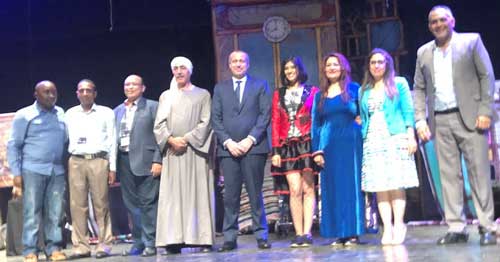
Egyptian Theatre troupe with Kevin Kimani after their performance of “8 pm” by Tomorrow Theatre Company at The Kenya International Theatre Festival, 2019
Are you pleased with how The Kenya International Theater Festival has been progressing?
There has been great progress, and it’s very inspiring for me to see such rich ideas being shared through the performances from around the world. They included spoken-word poets, storytellers and multi-media artists as well as students from Kenyatta University, shows scripted by Kenyans, including and KU’s theatre lecturer, actor, playwright Dr Fred Mbogo who brought two of his plays for staging at the festival directed by Esther Kamba, and Ogutu Muraya, David Mulwa, Mufasa the Poet, Teardrops and Kate Kabura. They were also well directed by Esther Kamba and Dr Emmanuel Shikuku.
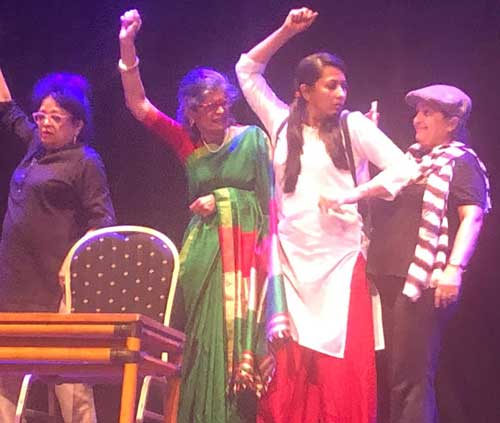
During a performance of Theatre for Change during The Kenya International Theatre Festival.
Plus, we’ve had exciting workshops covering acting, puppetry, dance, directing and production design. We’ve been able to explore ways of increasing audience participation at the theatrical performances, promote artist unity and theatre professional groups here in Kenya, and to explore the relationship between theatre and the media.
We’ve been able to bring together theatre artists, theatre academicians, journalists, government agencies and theatre enthusiasts in a pedestal of discussion, critique, and in national dialogues about theatre practices and education in Kenya.

Ronald Rand as Harold Clurman in “LET IT BE ART!” during a performance at the Nakuru Players Theatre, in Nakuru, Kenya in The Kenya International Theatre Festival
By being able to showcase these performances from other countries through the Festival, we’re able to see what they're doing in their work, and we also learn the challenges they’re going through to be where they are. It’s an excellent opportunity to cooperate internationally because the Festival is a global platform to come and share experiences, from your excellent “Art of Transformation” Master Workshop to your memorable performance as Harold Clurman in your play, “LET IT BE ART!”
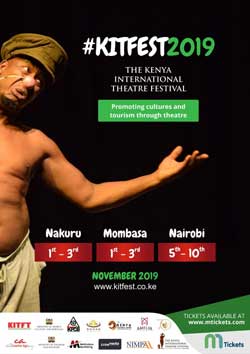 As well, there were workshops on various aspects of performance. For instance, Ogutu Muraya gave one on storytelling, Esther Kamba offered several on directing, South Africa's Goitsemang Pholo on acting, and dance by Jingo Ismail of Uganda.
As well, there were workshops on various aspects of performance. For instance, Ogutu Muraya gave one on storytelling, Esther Kamba offered several on directing, South Africa's Goitsemang Pholo on acting, and dance by Jingo Ismail of Uganda.
You've traveled to twenty-five countries to express these ideas so passionately. Therefore, it is a great fulfillment to see your work here, to see it happen in Kenya, and that is what I feel why it is strong and necessary to bring these international performances to this platform in Nairobi at The National Theatre. So that performers from around the world, and especially those in Kenya bring to the forefront what is going on in the society today. There are a lot of issues happening in this country, issues of racism, sexuality and gender, the issue of education. All of these need to be communicated and the theater is the best way to tell stories.
It makes it possible to show these issues on stage through characters - to be able to ask questions and confront ourselves. We want to express these stories on the stage through our directors and actors and writers here. To have a platform to express their ideas, especially with the globalization of cultures. The theater is the best way to communicate, to share what we have in common, and to give life from whatever has been written down. Through this process, it comes alive from what is in the mind to touch others. It was a great honor to have you come here with “LET IT BE ART!” It was an amazing production because of what it stood for and what it told us is possible through the theater.
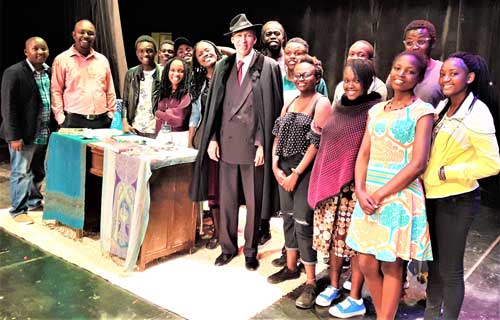
After a performance of Ronald Rand’s solo play, “LET IT BE ART!” at The Kenya International Theatre Festival, 2019 including Kevin Kahuro Kimani, Dr. Fred Mbogo, and audience members on stage
In 2019, you were also able to, for the first time, have performances outside of Nairobi.
Yes, the Festival actually opened on the first of November and ran for three days outside Nairobi, in Nakuru and Mombasa where performances were held at the Nakuru Players Theatre, and at Mombasa Little Theatre, as well as outside – in the Nakuru National Park, at Fort Jesus and on the beach.
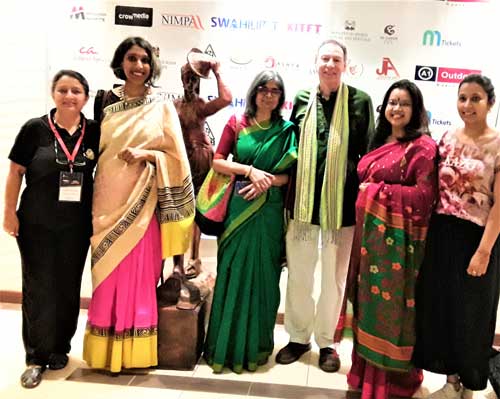
Ronald Rand with actresses and of Theatre for Change at The Kenya International Theatre Festival
It was most exciting in our 2019 Festival to have Kenyan performers, in addition to Ogutu, Mufasa and Teardrops, we also featured two plays by , “The Dying Need No Shoes” and “A Revolution Ate My Son,” one by Kenyatta University students by David Mulwa, “Redemption,” and the group calling itself Kauzi Creatives.
One evening we presented an Egyptian Theme Night, with performances from Egypt including an acting company from Cairo performing “8PM” by Hesham Ali, and the Egyptian Minister of Culture, Ahmed Ahvad came from Cairo. We presented an Indian evening with Theatre for Change from Bangalore, with a performance of an adaptation ofNtozake Shange’s “For Colored Girls Who Have Considered Suicide When the Rainbow is Enuf,” directed by Sujatha Balakrishnan, who was also in the play. We also had during the Festival a showcase between Nairobi Cinema where the mixed-media show, ‘Thearama’ was screened and staged, and at Alliance Francaise, Strathmore’s Drama Club staged Francis Imbuga’s classic “Aminata.”
I hope it was meaningful to hear Harold Clurman’s ideas which he expressed through my play, “LET IT BE ART!”
Yes. What I learned from his passion, that you have from Harold clurman and bring to life, so passionately, his ideas. What I still hold clearly is how Harold Clurman was able to take Stanislavski's ideas very powerfully and to express them to the members, the actors in The Group Theatre, and how they were able to express themselves in their productions that The Group Theater was able to bring to life. How they demanded from themselves the highest expertise so that acting demonstrated what was happening in the characters’ life and what was going on beneath the surface of the mask. And the way in which they brought their roles alive which certainly awakened the audiences.
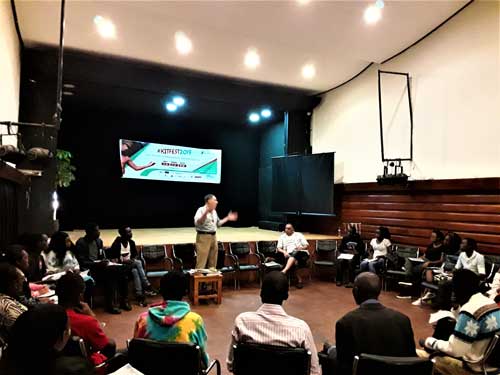
Ronald Rand teaching his “Art of Transformation” Master Workshop at The Kenya International Theatre Festival
Their process also allowed each actor to explore themselves, their imagination which is so important in acting, to use all of your body and yourself, to have the freedom to express the imagination. It gives you a higher respect for acting and also seeing how the character, Harold Clurman, demanded from you during your performance.
We were also able to see how the technique made it possible so that what Clurman communicates comes to the audience through the actor and this is the most engaging way through the Stanislavsky System, and we could witness Clurman through your transformation.
His work is inspiring to me, as he was such an extraordinary director, writer and teacher. I wish I had ten percent of the passion that you showed us that Clurman possessed, through your play, and the most important thing was how he gave so much of himself to educate others. And that is what is important – to give people today is the education of theater – to help people, to encourage people, to keep re-inventing the wheel.
You can see through this that people are not limited, and to explore all these kinds of ideas because it is of huge benefit to the people of our country. It’s stirring to have this kind of theater, to make this kind of communication possible through acting and directing. These are all the elements of the theater, and it is the best thing that we can give to our audiences and to young people today.
What do you look forward to occurring through the Festival as you forward?
Well, especially here in Kenya, by being able to have an international platform, it brings you an opportunity to have this kind of exposure from around the world. What I find is the commonality is that we all share. So much of what Clurman stood for, that we heard what he said. He studied around the world, in Paris and then when he went back to the United States and brought that education back with him and then he was with Stanislavsky, and he brought that back to America.
So, this is why we have this kind of platform in Kenya so the young people who are joining theater in Kenya can experience these kinds of ideas from around the world, to be challenged from ideas such as those of Clurman. His ideas certainly challenged everyone around him and as a critic he told us that we need to understand more, that we need to have more of an insight into the actor, into the audience, the designers and everyone involved with making theater. This is what I hope for the Festival – to be able to have this platform where you will new creations on the stage and some of these ideas have the potential to change us, and hopefully for the better.
~~~~~~~~~~~~~~~~~~~~~~~~~~~~~~
Ilire Vinca
 Kosovar theater and film actress, director, Ms. Vinca is also an acting professor at the University of Prishtina. She has played lead roles in plays by Shakespeare, Williams, Ibsen, and Stoppard with several directors from the U.S., U.K., and Bosnia and Herzegovina. Some of these performances took place in Bogota Theatre Festival and Off-Off-Broadway in New York City. Ms. Vinca’s performances include “Doruntine” in New York City and across Europe (a bilingual theater play); in Marsha Norman’s “night, Mother” in Tirana, Albania; “Refuge;” “Blessed Unrest” in New York City; and “Trojan Woman” with a well-known director, Andrei Serban at La Mamma. Ms. Vinca is the first Kosovar actress to participate in the Berlinale, appearing the film, “Forgiveness of Blood" in 2011, and in 2015 in “Sworn Virgin” Her other film work includes “Zana,” “Fence”, “A Drop of Blood,” “Unforgettable Spring in the Forgotten Village, “Marriage.” She is a Chairwoman at National Film Fund, and was chosen as the 24th member from Kosovo to join the European Film Academy, whose founding members included Pedro Almodovar, Lindsay Anderson, Bernardo Bertolucci, Sir Ben Kingsley, Andrzej Wajda, and Wim Wenders. Ms. Vinca has received several awards as Best Actress. She was chosen twice as a nominee in 2017 and 2020 for the Gilder/Coigney International Theatre Award in New York City.
Kosovar theater and film actress, director, Ms. Vinca is also an acting professor at the University of Prishtina. She has played lead roles in plays by Shakespeare, Williams, Ibsen, and Stoppard with several directors from the U.S., U.K., and Bosnia and Herzegovina. Some of these performances took place in Bogota Theatre Festival and Off-Off-Broadway in New York City. Ms. Vinca’s performances include “Doruntine” in New York City and across Europe (a bilingual theater play); in Marsha Norman’s “night, Mother” in Tirana, Albania; “Refuge;” “Blessed Unrest” in New York City; and “Trojan Woman” with a well-known director, Andrei Serban at La Mamma. Ms. Vinca is the first Kosovar actress to participate in the Berlinale, appearing the film, “Forgiveness of Blood" in 2011, and in 2015 in “Sworn Virgin” Her other film work includes “Zana,” “Fence”, “A Drop of Blood,” “Unforgettable Spring in the Forgotten Village, “Marriage.” She is a Chairwoman at National Film Fund, and was chosen as the 24th member from Kosovo to join the European Film Academy, whose founding members included Pedro Almodovar, Lindsay Anderson, Bernardo Bertolucci, Sir Ben Kingsley, Andrzej Wajda, and Wim Wenders. Ms. Vinca has received several awards as Best Actress. She was chosen twice as a nominee in 2017 and 2020 for the Gilder/Coigney International Theatre Award in New York City.
What does it mean to you having been chosen as a nominee for the 2020 Gilder/Coigney International Theatre Award?
It’s a reminder, that we should never stop working. It’s a sweet reminder to encourage myself to continue understanding the strange grey area between black and white, searching for the truth, responding. I feel I was given the opportunity to join the harmony of all the voices of theatre worldwide.

You have said: "While borders divide us, art unites us regardless of race or gender, as are feelings and truth. What do you consider the greatest gift that art can help in the midst of the current situation?
I have undergone various strange circumstances throughout my young adulthood up until now. I was the first generation of acting class in 1989, at eighteen years of age, when we had to study in illegal ‘parallel’ schools, led by Albanians. The political situation for ten years until the war started was a long struggle for freedom and justice.
The peace is yet another war, as we – Kosovars - still remain isolated from the rest of the world. Being connected virtually makes the isolation even more paradoxical. I would love it if the world would now take a moment to ask themselves how this isolation feels.
It is this moment that we could use to remind ourselves that in front of terror and pain, we are all the same. I use my art to shed light upon the untold, unseen, and unheard.

Ilire Vinca in production of “Refuge” at Baruch Performing Arts Center, New York City. The text was by Matt Opatrny, Florent Mehmeti and the ensemble. The play was staged by a collaboration between the Blessed Unrest Theater Troupe of New York and the Oda Theater in Kosovo. Directors: Jessica Burr and Florent Mehmeti.
How have you been able to cope with the situation during the Pandemic, in staying creative and in a forward-thinking way?
During the pandemic, I was in a backward-thinking mode. My Mother passed away a week before the Pandemic started. That week was an opportunity for the whole family and friends to be together, holding hands, hugging, crying and laughing while we remembered my mother’s life, and the love that she has given us.
Only a week after, me and my two daughters started our quarantine at home, while the youngest, studying in the States, couldn’t travel back home for her twentieth birthday. Skype offered us a virtual birthday party, and we still managed to have a celebration. In the contrary, our cat was overjoyed with our presence and cuddles, and as a “gift” she gave birth to four kittens.
So, while I was ‘backward thinking’ to feel closer to my mother, each day was giving me the opportunity to see that life is an unstoppable cycle. Within the cycle we are all the same. My cycle these months was connecting what was, is, not knowing what will be, but marking my path with hope and love.
You performed in Jeton Neziraj’s “Hypocrites or the British Patient,” directed by: Blerta Neziraj & Agon Miftari. You received a Best Actress Award for your performance. What did it mean to you perform in this play?
Every performance brings me a piece of myself in a different light. This character was so different from me, and I love when this happens. As a modern play, this satirical comedy, is showing the ugly side of society, it doesn’t come from past, it speaks what we experience in our daily life. Jeton is sharp and bold in writing about it, and Blerta vividly makes strong images.
And as an actress, some of my favorite projects are those that allow my character to speak in the present. Having the writer among us, joining our discussions made the project highly interactive and in continuous transformation. This gives me the opportunity to say my truth as well.

You were part of Euripides’ 2,500-year-old tragedy, which was inspired by the conquest of Melos by the Athenians in 416 B.C. during the Peloponnesian War. You were part of a cast of about fifty performers. Some of the performers came from war-torn regions of the world where prior collaborations had taken place including Cambodia, Guatemala, Kosovo (Serbs, Albanians, Roma), including from New York and members from the original cast from La MaMa in 1974. You had played Andromache, the wife of Hector. What was the rehearsal and collaboration process like? And what did you learn from the experience of performing in this particular production?
Two years ago, a team of La Mama’s original team, came in Kosova, introducing us to the idea of bringing back “Trojan Women,” with a new cast from places that experienced war. Then we worked on this epic opera, in the same way it was shown in 1974.

“The Trojan Women” performed at La MaMa in 2019, directed by Andrei Serban with The Festival company including Albanian (Ilire Vinca), Cambodian, Guatemalan, Mayan, Roma, Serbian, and U.S. artists and La MaMa's Great Jones Repertory Company celebrating the centennial of La MaMa’s founder, Ellen Stewart, the 45th anniversary of the “The Trojan Women” and five years of The Trojan Women Project's work in three countries
The most interesting thing was memorizing the language that didn’t belong to any part of the world, as it was composed from Elisabeth Swados. Liz and Ellen weaved a thread of old rituals, words songs and rhythms that transcends the story and evoked emotions. A part of my war experience was there, once performance started, recalling my own experience, I was living my own life on stage.
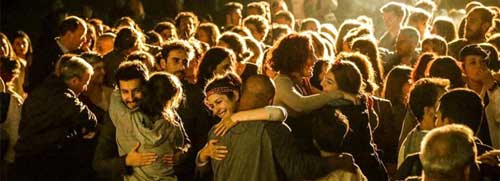
“The Trojan Women” performed at La MaMa in 2019, directed by Andrei Serban with The Festival company including Albanian (Ilire Vinca), Cambodian, Guatemalan, Mayan, Roma, Serbian, and U.S. artists and La MaMa's Great Jones Repertory Company.
Every moment of the performance reminded me of the war in Kosova – twenty thousand women were raped twenty years ago; men being executed in front of their family. And still there are over sixteen hundred and fifty-two missing people.
A mother in Gjakova, makes her table every day, in a ceremony, for her five sons and her husband she lost in the war, not even having found them yet. These stories are part of me. I’ve been living through this war myself. And even here, in United States, I witnessed, a lot of injustice. Kids being torn apart from their mothers, racism, building border walls; this is something we all see every day…
You also performed in Marsha Norman’s Pulitzer Prize winning drama, “night, Mother” at the Tirana Metropoli Theater, directed by Ema Andrea. What did you gain as an actress from working on this play and working with Ms. Andrea?
When we love someone, we are scared of losing them. Sometimes, we keep some truths inside, until we are pushed to say it out loud. Being a mother myself, helped me realize that truth is a very important ingredient to make strong relationships, and your kids are not yours and you need to raise them so they can live their lives by their own way.
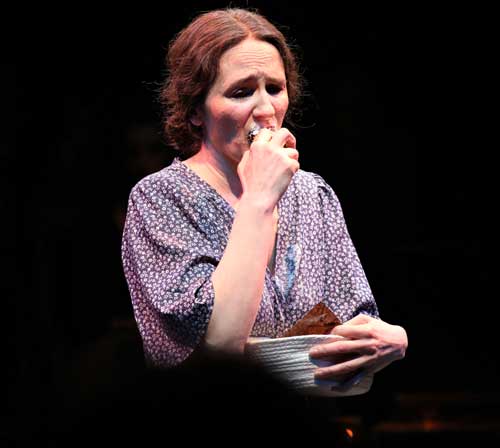
Ilire Vinca in Marsha Norman’s “’night, Mother” at Tirana Metropoli Theater, directed by Ema Andrea.
I loved this part so much, and the collaboration with Ema was beautiful and very inspiring. Being an actress and a director herself, Ema gave me the confidence and freedom to explore, as she was joyful and silently watching. She is such a rich soul and creates a wonderful environment, to be creative, to be sincere. It almost doesn’t feel like acting any more…
What brings you the greatest joy being an actress?
Once after a performance, a woman contacted me and wanted to meet. In a beautiful and sunny day, we went for a coffee. As we started to talk, she said that my performance has changed her life. She was struggling in life searching for a resolution, and after she saw the performance, she decided which path to choose. We are friends now, and she is happy.
As an actress, I believe that art connects us in a world – that anything is possible.
~~~~~~~~~~~~~~~~~~~~~~~~~~~~~~
Avra Sidiropoulou
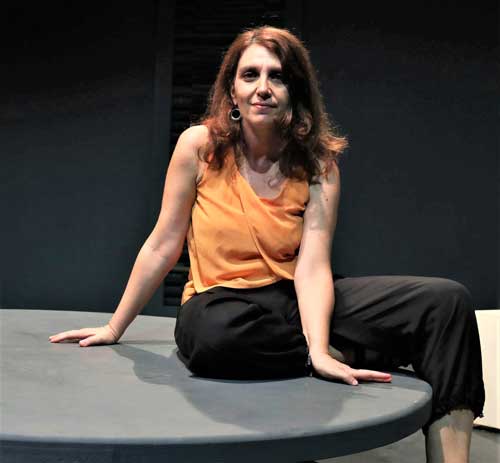
Is Assistant Professor at the Μ.Α. program in Theatre Studies at the Open University of Cyprus. She is the Artistic Director of Athens-based Persona Theatre Company, with which she has directed works from the classical and contemporary repertory, lectured and conducted directing workshops in Greece, Cyprus, Turkey, the United States, the U.K, Japan, Israel, Bulgaria, Estonia and Iran. Prof. Sidiropoulou’s main areas of scholarly specialization include directing theory, the ethics of adaptation, contemporary dramaturgy and practice as research. She is the author of two books: “Directions for Directing: Theatre and Method,” and “Authoring Performance: The Director in Contemporary Theatre.” Ms. Sidiropoulou taught directing, acting, theatre history and theory at the University of Peloponnese (Greece), the Aristotle University of Thessaloniki (Greece) and Bosphorus University in Istanbul (Turkey), as well as in various drama conservatoires. She has contributed articles to international peer reviewed journals and chapters to international edited volumes. She was a Japan Foundation fellow in. Japanese Studies (2015), conducting research on the current Japanese theatre scene at the University of Tokyo. She was also a Visiting Scholar at the Martin E. Segal Theatre Centre at CUNY, New York (USA), a Visiting Scholar at the MIT Music and Theatre Department, Boston (USA), and a Visiting Researcher at the School of the Arts at the University of Surrey, U.K. She is currently undertaking a research project on theatre's response to 21st crisis at the Freie University, in Berlin.
You’ve been in Cyprus since March – in the midst of the lockdown and now with things being opened - how have you continued to fuel your creativity? What have you learned about yourself –and the questions that have come to you, especially as the Pandemic continues across the world?
For me, the lockdown was a time of introspection and self-forgiveness. There was great value in this pause, an “alibi” to do less and feel more. Cutting yourself off from the outside world forces you to move inwards. Often, the pressure to implement one’s ideas, the mechanics of production, replace creativity itself. The quarantine allowed our brains to rest, with no distractions around us, and plunge into the depths of our humanity.
I continued to work constantly, of course, but somehow the inessentials didn’t matter anymore. I think my fuel was the sense of connection with everything that was happening in the universe at the time – the urgency, the common despair, the awareness that life has changed and that we need to become more compassionate and more loving toward one another.
I read whatever I could lay my hands on that related to the pandemic: medical reports and statistics, personal testimonies, stories about the struggle of people trying to keep alive and of the frontline healthcare workers who were helping them survive.
Yes, there were a couple of recurrent thoughts that kept popping up during those months: what can I learn from this crisis? How can I value life more? How can I become part of the solution rather than of the problem?
I thoroughly enjoyed your talk with Frank Hentschker on Zoom. He is a dear friend of mine, and we have collaborated together on several projects at CUNY’s Segal Center. You mentioned theater will change. What do you envision might or should take place?
It is time for new rules and new coalitions. It’s time to move beyond “post’s” and “meta’s” and create a vital present. What the pandemic exposed was a burning need to create, to express, to connect in a raw sort of way, focusing less on production values and more on story, on emotions, on the truths that we keep from each other.
During the time of the lock-down, with the physical restrictions and the shutting down of theaters, this need could be fulfilled only partially, through the imagination and, thankfully, the Internet. A number of new connections were formed through Zoom and other platforms, new modes and forms of theater-making have emerged from this inevitable digitization of our experience.
Now that things are slowly returning to some new normal (at least in Greece and Cyprus), we should keep the same level of experimentation and trust in innovation that kept us going during these challenging times, without losing sight of the uniqueness of human contact and the embodied purity of the our art when we are finally able to go physically back to the theater and work.
What have you been most proud of that the Persona Theatre Company has created and shared with the world?
Whenever I think about what we’ve created with Persona, I feel really proud. I am especially proud of our resilience, doing meaningful work outside of a notoriously non-meritorious system. More importantly, I am proud of our vision of theater-making as a way to connect with people and become more aware of what is special, unique, but also common in all the artists, across spatial, temporal and cultural borders.
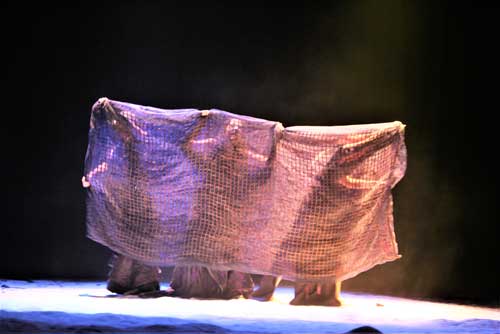
“Triple Carpet” production by Persona Theatre Company
Persona Theatre Company is a very small hub of exceptional talent, which has had the opportunity to travel and work in different parts of the globe, exchanging texts, images and work methodologies.
Whether that was through projects such as “Clytemnestra’s Tears” (bringing together the sensibilities of Greek, Turkish and British actors), “And God Said” (for which Greeks, Turks and Iranians collaborated in Istanbul and Tehran), directing workshops on Greek tragedy with Arab and Jewish students in Israel, presenting “Tα Δάκρυα της Κλυταιμνήστρας”in Greekat La MaMa for three weeks, working with Italian, Greek, British and American actors in Verona for a project uniting “King Lear” with “Oedipus at Colonus” or staging the multimedia “Phaedra I” –in London.
I hope we will continue to reach out for cross-cultural and cross-disciplinary collaborations, in order to build bridges that not only enrich our understanding and experience of theater, but also help us make the world the better, more open place it deserves to be.

“Clytemnestra’s Stair” production by Persona Theatre Company
I understand you’re working on an adaptation of an American short story called “The Yellow Wall Paper.” Why did you choose that, and in what way are you using it to create theater?
While in lockdown, I had this idea of turning this gem of a short story into a short “film-meets-literature-meets-theatre.” Written in the 19th century by Sarah Perkins Gilman, “The Yellow Wall Paper” is a proto-feminist story is about the insidious, yet tyrannical attitudes of patriarchy. Τhe protagonist obsessively documents in her journal the color and patterns of the wallpaper of the room in which she has been imprisoned by her physician husband as a “cure” for her depression.
The surreal and the grotesque element come together to reveal the fear and oppression that have held women captive for the longest time. I’m adapting the story into a digital mixed media form, to create an impressionistic visual environment for the imaginary world which the narrator inhabits.
The idea is that real life footage shot for the purpose of this video, or derived from my animator Emy Bulloch’s personal archives, will be combined with digitally drawn images, an abstract sound-scape interspersed with real actors’ voices.
How were you first introduced to theater? And what drew you that it had to become the focus of your life?
I come from a family who loves the arts and enjoys reading very much. From an early age, going to the theater was part of my routine. Moreover, I used to spend hours drawing costumes for different characters in plays, but I also liked writing stories. So, I’ve always known that I would have to be involved in the theater in some capacity.
I directed my first play, Ionesco’s “Bald Soprano”when I was studying English at Cambridge. That was I think when I realized that the best way to combine all my passions was be being a director, which seemed to suit my personality, anyway.
When I finished my MPhil degree, I left the UK for the United States, much to my parents’ dismay, to explore different theatre options. I watched a lot of plays at first, and after a few months I enrolled at the MFA degree in Directing at Columbia University. That training really shaped my theater aesthetic and awakened me to alternative ways of perceiving performance and expressing myself creatively.
What does it mean to you to be a Gilder/Coigney International Theatre Award nominee?
I am so very honored and humbled! It’s a unique privilege to be in the company of such talented people. I was really looking forward to traveling to New York City for the October celebration week, but because of the pandemic, the award ceremony will happen online, instead. I do hope there will be a chance for us all to meet in person in the future and create collaborative ties that will serve the international scope of the award.
That said, there is another, more personal reason why I was excited to hear I was nominated: In my first few weeks in New York, as I was about to embark on a long and conscious theater adventure, I was really fortunate to have met Martha Coigney, who was at the time Head of the New York Office of the International Theatre Institute.
When I knocked at her door at of the blue, naively asking for advice to navigate myself through the inexhaustible New York theatre scene, she was extremely kind and generous, and introduced me to the Marton Literary Agency, which is where I started working at once. Part of that great job was to watch a lot of shows and read new scripts. Ms. Coigney had really opened a door for me, and I take this nomination to be a little token of my gratitude to her.
You talked about the relationship the theater makers in Greece feel towards their history, with a sense of guilt and awe to the classics and the myths. What do you see as the way forward now in telling your stories?
All these months there has been endless talk and speculation about the future of one of the most ancient forms of art. In the midst of despair, theater has been given the chance to reinvent itself and reach out to more people.
New plays are bound to emerge out of this pandemic and inevitably Greek artists can only move along this trend, in fact, along the need for strong, vital stories that will combine the contemporary with the universal and the timeless, the way classical tragedy has done.
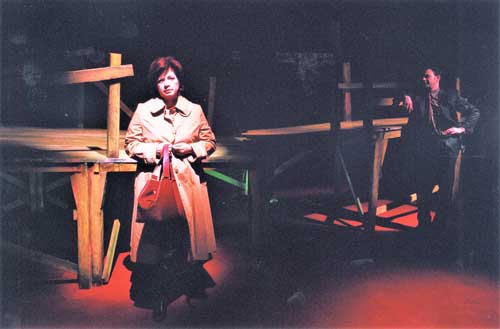
“Lunch” production by Persona Theatre Company
For, if there is one thing that the pandemic reality has made clear is that everything in the universe is interconnected. While things like the number of seats permitted per show or the profit production companies may be able to make once theaters reopen don’t look too promising, aside and underneath the business side of things, I’m optimistic that theater will discover more powerful ways of speaking to its people.
What may be regained is the ability to unapologetically ask the big questions: about life, about people, about society. In this sense, I am hoping that artists in Greece and elsewhere will be able to approximate the spirit of our predecessors, who thought it their moral responsibility and civic duty to bring the art to the people and make the polis central to the experience of spectatorship.
One of the new works performed recently there was “Clean City.” What made it as impactful and meaningful for our time today?
“Clean City,” a production directed by Greek artists, Anestis Azas and Prodromos Tsinikoris in 2016, brought together the stories of some of the immigrant cleaning ladies of Athens, using a documentary theater frame.
It was successful in using “real experts” to reflect on the dire, uncertain social, economic and cultural conditions that have defined the recent history of Greece, and in critiquing perennial stereotypes relating to our perception of the “other” and to ideologically fraught notions such as “cleanliness.”
More than anything, I believe the show was popular in introducing a fresher outlook on what political theater means and how it may be performed today.
What kind of a role can theater play towards, as you put it, helping to make the world just?
The sense of solidarity, of connection with the world and the understanding that we are all affected, which was built during the pandemic, are, I believe, things that we should capitalize on, both on a personal level and as artists, once the crisis is over. There is something essential about a massive crisis such as this, which can only lead to epiphany and to change.
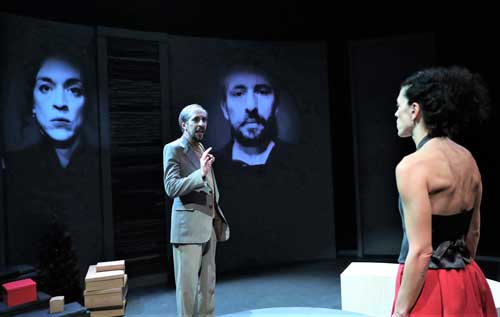
The pandemic has exposed chronic inequities that we should no longer ignore. In the light of what is currently happening in the United States and the demand for racial justice, American philosopher and gender theorist’s Judith Butler’s questions: “Who counts as human?” “Whose lives count as lives?” and finally, “What makes for a ‘grievable’ life?” are extremely pertinent.
Theater needs to get back to the meaningfulness of things – to what is necessary, what should never have to be negotiated. We must rethink our responsibilities as artists, which, at his moment in time, is to provide solace and healing to our communities. These are things that can lead us to different choices.
I can’t see, for example, how theater can stay immune to the hunger we are all experiencing to share the stories we wrote and imagined when we were locked inside our homes, watching loved ones go, watching the entire world fall apart. Somehow, I feel, performances will become informed by this inner struggle, more involving of the audience, more agonistic. At least, I hope they will.
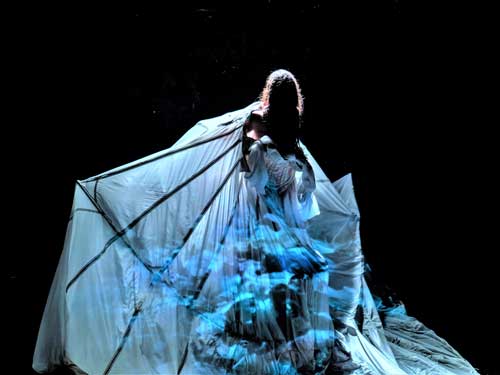
~~~~~~~~~~~~~~~~~~~~~~~~~~~~~~
Sujatha Balakrishnan
 Founder of Theatre for Change, a teacher/counselor and an actress based in Bangalore, India. Theatre for Change helps address and sensitize us and more importantly our children to social issues and ISMs in a theatrical format. Past President of the Bangalore chapter of Soroptimist International, a global service organization of women whose core vision is to ‘educate, empower, enable.’ She has been involved in various projects that focus on the above objectives and spearheads, “Stars of Tomorrow,” a communicative English teaching program at the government school in Bangalore North. Theatre for Change has presented performances across Bangalore and India, and recently performed at The Kenya International Theatre Festival in the National Theatre of Nairobi, Kenya.
Founder of Theatre for Change, a teacher/counselor and an actress based in Bangalore, India. Theatre for Change helps address and sensitize us and more importantly our children to social issues and ISMs in a theatrical format. Past President of the Bangalore chapter of Soroptimist International, a global service organization of women whose core vision is to ‘educate, empower, enable.’ She has been involved in various projects that focus on the above objectives and spearheads, “Stars of Tomorrow,” a communicative English teaching program at the government school in Bangalore North. Theatre for Change has presented performances across Bangalore and India, and recently performed at The Kenya International Theatre Festival in the National Theatre of Nairobi, Kenya.
How have you and the actresses and writers of Theatre for Change coping with the virus, and staying positive and strong in your commitment to the work
It’s been a tough phase with no external events happening. But that does not deter artists from pursuing their passion! Thanks to technology that’s keeping theatre art alive during this lockdown. We’re involved in a number of online sessions like play reading, a number of sessions for children. Our current storytelling initiative for children on the Navarasas or the nine human emotions is a super hit with the young viewers. We firmly believe "The show must go on!”
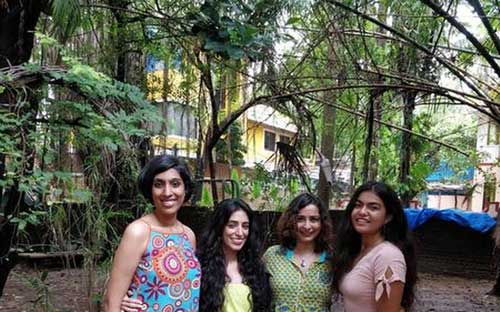
The cast of “When the Rainbow is Enough” of the Bangalaru-based theater group, Theatre for Change
As you grew up, did you see a lot of theater and become involved as a young person in the arts?
Absolutely! I grew up watching Tamil plays by theatre stalwarts, Manohar and Cho Ramaswamy, whose plays were all about social criticism and political activism, not English theatre. In short, critical thinking and questioning society was imbibed in me through these stellar actors.
I vividly recall a play that I watched as a child of twelve from the great epic Ramayana titled "Lankeshwara, The Lord of Lanka,” where Sita was portrayed as Ravana’s daughter. It was well received and ran into a lot of controversies as well.
This is what one faces when a story is interpreted with a different and a critical perspective as we’re always filled by dominant narratives. The stage and the spotlight have fascinated me from a very young age. So, I made sure to grab even the smallest opportunity to be on stage!
Why does making new work in the theater mean so much to you?
The vision of Theatre for Change is purely addressing community problems. The innumerable social issues – the various “isms” in particular – provide us an opportunity to address them through theatre art in different formats. This makes every piece of work new and engaging.
Were your parents supportive of your life in the arts?
Being born and raised in a conservative Tamil Brahmin household, anything to do with the stage or spotlight was a taboo. But that did not dissuade me from participating in school and college plays. Since, it was an internal affair, it was not objected. So, my roles were nothing big, but it gave me the platform to pursue my passion in a small way.
Interestingly, after I was twenty years old, I portrayed diverse roles on the stage in a play called “LIFE!” as a wife, mother, daughter in law, a teacher, counselor, to name a few.
Why were you compelled to bring Theatre for Change into being and what remains some of the greatest challenges you face?
As a teacher and a counselor, I am appalled the way in which the differently abled community is seen with a different lens. As a theatre practitioner, I thought it was my duty to address this through theatre art. And so was born my not-for-profit initiative “Theatre for Change,” in 2015.
The first performance was a short ‘awareness’ theater piece on special needs children. The protagonist was played by an autistic child. As she was unable to express her emotions, a voice- over was given to convey her message to society. It was a resounding success and there was no looking back from there until now.
Challenges are certainly in initiating a community dialogue as it’s a herculean task to have conversations on culturally stigmatized topics! Nonetheless, I should say I feel we have done a fairly decent job.
How do you choose the actresses in the Company and the writers?
We conduct auditions which focus not on acting skills, but the openness to new and unconventional ideas, and the ability to tell your story, as I feel no one else could tell it better. We believe each person has a story to share that’s been ‘buried under the carpet,’ and are looking for a platform to share this story with conviction, courage, honesty and pride.
The underlying principle is to bring counter narratives to the forefront and certainly not to preach or rant about one’s grievances. It is to reiterate the power of storytelling – to reflect the immense inner strength that all of us have and what it means to have control of your own story. One’s journey of weathering the storm and seeing sunshine.
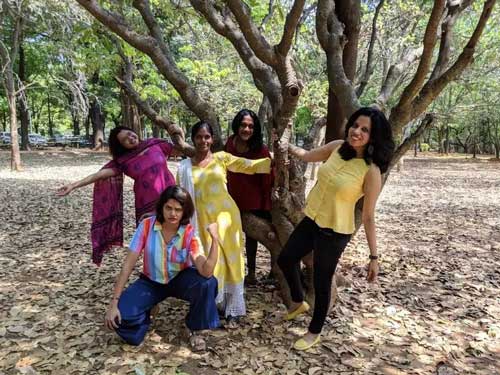
Actresses of Theatre for Change
Why did you choose to adapt Ntozake Shange’s “For Colored Girls Who Have Considered Suicide When the Rainbow is Enuf” and what do you want to say to your audiences today, and especially young people, through the work you’re creating through Theatre for Change?
I feel it’s important to provide a platform for women who are fifty years old, to share their stories of how they became who they are and how they navigate challenges in their path. Every story has a soul. It needs to be told and heard.
When I was looking for women-oriented theatrical productions on oppression and discrimination, I came across Ntozake Shange's brilliant piece. Initially, the performance began as a seniors’ show but soon became an inclusive one that went across age, gender and class. The International Women’s Day performance brought together women cab drivers Yashoda Satyanarayana and Divya Srinivasalu along with transgender activist Shanti Muniswamy boldly sharing their stories.
Life is too short and sweet to have regrets. So, follow your heart which certainly is not an easy path. Be prepared to confront challenges with grit and determination. You’re on this journey alone, but like-minded individuals will join you as your support system if you decide not to break your journey and keep driving towards your destination. Just go for it, else life becomes a mundane existence! As the Nigerian writer, Chinua Achebe wrote: “Until the lions have their own historians, the history of the hunt will always glorify the hunter.”
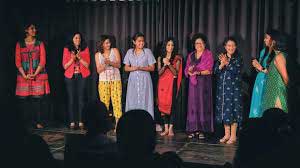
Theatre for Change performance of “When the Rainbow Is Enough,” adapted from American playwright Ntozake Shange’s “For Colored Girls Who Have Considered Suicide When the Rainbow is Enuf,” the play directed and curated by Sujatha Balakrishnan at the Colombo International Theatre Festival, Sri Lanka, 2019
~~~~~~~~~~~~~~~~~~~~~~~~~~~~~~
Mihaela Dragan
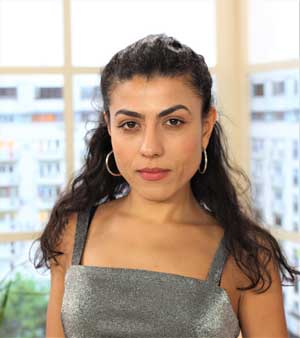 Romanian Roma actress and playwright, she founded the Giuvlipen Roma Theater Company in 2014, living in Bucharest and she performs in several European countries. Over the past years, she has worked in Berlin as an actress at the Maxim Gorki Theatre, Heimathafen Neukölln, and Theater Aufbau Kreuzberg. She is also a trainer at Theatre of the Oppressed where she works with Roma women on their specific issues in Romania. Ms. Dragan has been working with refugee girls in Germany as a theatre trainer. She was one of the six finalists for the 2017 Gilder/Coigney International Theatre Award, and a 2020 nominee. In 2018, Ms. Drăgan was a resident artist in Hong Kong at Para Site Contemporary Art Centre, where she was developing “Roma Futurism,” that lies at the intersection of Roma culture with technology and witchcraft. It was acknowledged by PEN World Voices International Play Festival 2018. In 2019, Ms. Dragan was selected as one of the playwrights for the Royal Court Theatre International Summer Residency in London.
Romanian Roma actress and playwright, she founded the Giuvlipen Roma Theater Company in 2014, living in Bucharest and she performs in several European countries. Over the past years, she has worked in Berlin as an actress at the Maxim Gorki Theatre, Heimathafen Neukölln, and Theater Aufbau Kreuzberg. She is also a trainer at Theatre of the Oppressed where she works with Roma women on their specific issues in Romania. Ms. Dragan has been working with refugee girls in Germany as a theatre trainer. She was one of the six finalists for the 2017 Gilder/Coigney International Theatre Award, and a 2020 nominee. In 2018, Ms. Drăgan was a resident artist in Hong Kong at Para Site Contemporary Art Centre, where she was developing “Roma Futurism,” that lies at the intersection of Roma culture with technology and witchcraft. It was acknowledged by PEN World Voices International Play Festival 2018. In 2019, Ms. Dragan was selected as one of the playwrights for the Royal Court Theatre International Summer Residency in London.
How did your early life and your family set the stage for you to want to express yourself through art, and eventually as an actress?
I am part of a family of Roma musicians whose musical tradition goes mainly on the paternal line. I grew up around musicians and I remember as a child being fascinated by their performances. I was looking at them as characters and I wanted to be one of them: to bring people joy through my craft.
Musicians around me were all men but soon I discovered the women-shows on television, so in my child’s mind I decided that I will be an actress. Moreover, I used to like poetry and to imitate people, to tell jokes and organize mini-shows for my colleagues in school. This is how I spent my childhood, and I do not know why I did not change my mind during my adolescence.
In high school I joined a theater group and until I graduated, every vacation we participated in theater festivals for high schools. It was a lot of fun. My family has always supported me in this decision of becoming a professional actress.
How have you been coping with the Pandemic? What have you learned about yourself in the midst of this crisis and what the situation has meant for the Roma people?
I was pretty much affected due to the repeated abuses of the police against Roma people all over Europe during the pandemic. Taking advantage of the lockdown, police reinforced its power over the most vulnerable communities, and I noticed how the hate speech on social media has increased against us trying to find scapegoats for the spreading of the virus. When in fact, a lot of Roma communities have been neglected and let in precarity by the Romanian state.
Besides this, it was a period of self-reflection, taking into consideration that the pandemic has come with the impossibility of performing for a while now. I have missed theater, but at the same time, I have felt the need to re-define myself as an artist by producing video art works.
What does it mean to you to be Roma? How has it added to your life, and your work as an actress?
I feel very proud of being a Roma woman. I am proud of my ancestors and of their resistance during all our oppressive history: from the five centuries of Roma slavery in the past history of Romania, to the Roma genocide under the Nazism regime.
Because the representations of Roma in media and artistic discourse were very stereotypical, together with other actresses I co-founded the first Roma theater company in Romania.
Our identity is a big part of our theater work: all these years, through Giuvlipen – our independent company, we have produced Roma feminist and queer theater shows in order to represent Roma people, in which there is a misconception of being conservative and traditional.
Our wish is to show Roma culture from a progressive perspective, to dismantle the prejudices against us as Roma women and to create contemporary theatre shows that can give pride to Roma people.
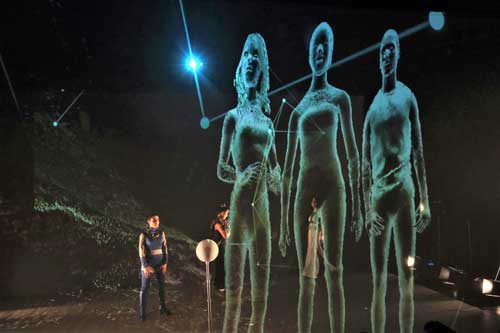
“Planet Romacen” with Mihaela Dragan
I understand you invented a word for “feminism” in Roma, and there are only three Roma theaters in Europe. What are your goals to make Roma art in the future - and to share with your community?
Actually, “Giuvlipen,” the name of our theater company means “feminism” in the Romani language. The term came out from the purpose of showing to the world that we, the Roma actresses, have a plan to revolutionize Roma culture through our feminist visions.
I believe in the power of the words so I felt that “Giuvlipen” can be a word that can watch over us as a good spirit in our artistic mission.
Unfortunately, yes, I also know there are only three Roma state theaters in the world, and all of them have incorporated a folkloric vision on Roma culture focusing especially on Roma music and dance. This is why, we, at Giuvlipen wanted to create diversity.
I am glad that you asked me about making future Roma art because the future as a theme preoccupies me a lot in my art. I want to explore it more in my work. My goals for the present and the future are to increase the Roma artists community and this is why in Giuvlipen, we want to give a voice to the new generation of Roma actresses and actors who can reinvent themselves as artists as me and my colleagues have felt we were doing since we have created the group.
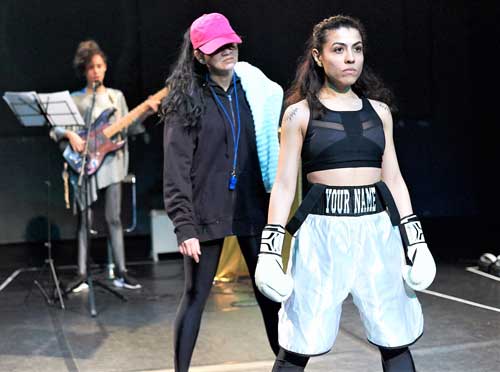
“Urban Body” with Mihaela Dragan
Who have been influences on your style as a playwright, and what other playwrights from the past that mean a lot to you?
Because in Romania there was no Roma dramaturgy, I was a lot inspired by Persons of Color (POC) artists and writers who fulfilled the void for me. As an actress I had to write because we did not have any Roma plays to perform. Some of Giuvlipen’s plays were written collectively, few of them I wrote entirely.
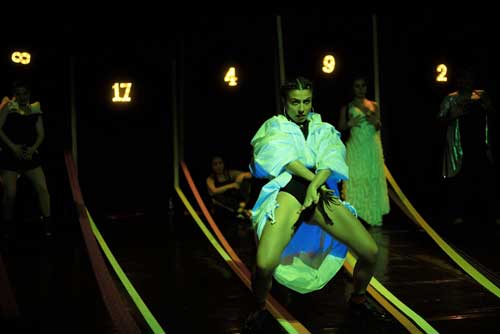
“Sexodrom” with Mihaela Dragan, a group theatrical production, written by Mihaela Drăgan, Antonella Lerca Duda, Nicoleta Ghiță, Zita Moldovan, Bety Pisică, Oana Rusu, Raj Alexandru Udrea
Honestly, I did not feel very attached by the playwrights from the past, I have always been looking for new forms of expression. Still, if you want me to give you some examples, I liked very much Jean Genet. I like Caryl Churchill and recently, I discovered very talented young playwrights like Jasmine Lee Jones.
You wrote a science fictional play about a future utopian society of Roma witches who control technology and fight neo-fascist politics in Europe.Why did you want to write this play? And what has been the reaction you have received?
A: Well, the story of “Romacene: The Age of the Witch” is this: In the last two years I have tried to develop a new concept - Roma Futurism. Due to our oppressive history as Roma people, I felt that the victimization does not give us enough space to think about future and our role into this future.
So, I started to create narratives about Roma people in the future using science fiction elements, fantasy and alternative histories. I knew that Roma people prevailing in the future sounds radical for the racism that exists now across Europe in which we’re living these days.
At the beginning, I wrote a Roma-futuristic scene for the play “Medea Romnja,” which was premiered in Berlin, and after that, I wrote “Romacen” during my residency at Royal Court Theatre in London. Both shows were very well received, and I am grateful that Roma Futurism caught the attention of the audience. Especially, because I wish other Roma artists to trust and to take forward the concept by creating a whole Roma Futurism movement.
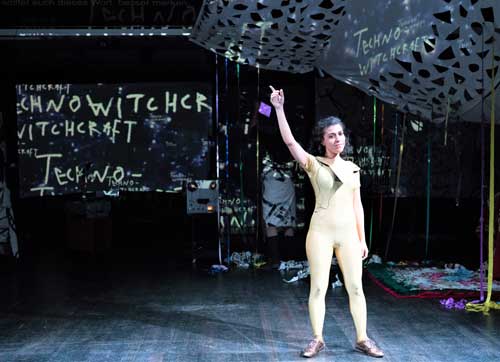
“Medea” with Mihaela Dragan
You have talked about wanting to create a Roma State Theatre. Why would that be important and what would it mean for the Roma people?
It is important to create a Roma State Theatre in Romania because this will be an acknowledgment gesture of our art and its contribution to the development of the Romanian culture. After all of our history here, Romania owes us at least a cultural institution.
Roma are the second largest minority in Romania and deserves to be represented. Moreover, as independent artists, Roma actors lack support, budget and a space for their productions. We always have to apply to independent funds in order to assure the continuity of our shows, and I feel that this is unfair to us.
In 2021, Timisoara has been selected with Romania to host the European capital of Culture – How are you planning to be involved?
We have already been invited to perform three of our productions in this context in Timisoara, and to participate to talks and conferences on Roma culture. Hopefully, this will be an opportunity to reflect again about the necessity of creating a Roma state theater.
Congratulations on being chosen as a nominee for the 2020 Gilder/Coigney International Theatre Award. What does it mean to you having been chosen?
I feel deeply honored to be again nominated for this award which acknowledges the work of women theater makers all over the world. I think many of us have struggled a lot to change the status-quo of theater in our own countries. We have produced new theater practices which can impact the way in which other women artists are seen in this world.
In the end, our art is a form of resistance, and I am glad to be inspired by other women. Our work deserves to be celebrated and promoted and I am grateful for this award supporting us.

“Gadjo Dildo” with Mihaela Dragan
~~~~~~~~~~~~~~~~~~~~~~~~~~~~~~
Farah Deen
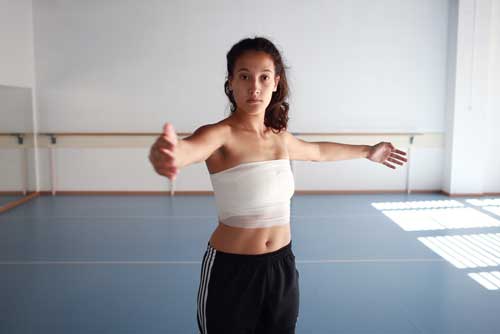
Farah Deen rehearsing for solo piece, “the Sky above, the Mud below”
A world-renowned Hip-Hop dancer, choreographer and coach, Ms. Deen has explored new ground, both in terms of her individual technique and innovative approach. She grew up in Salzburg, Austria. Her mother is a native Carinthian, her father originally comes from Muslim-shaped Sri Lanka. Within her personal social environment, she experiences influences from both cultures along with their compatibility and clashes. Ms. Deen performed her acclaimed solo piece, “the Sky above, the Mud below” with Hungry Sharks, the Urban Dance Company from Austria, recently at Colombo International Theatre Festival in Sri Lanka. The themes within her work were based on elements from her autobiography. Through the spectrum of her personal experience, she examines polarizing social categories and sheds a light on their boundaries and grey areas. She ventures into a theatrical context on a journey through the fields of tension arising from religion and femininity. With Hungry Sharks, she has also performed in“#fomo - the fear of missing out,” “Anthropozän” and “Hidden in Plain Sight.”
I had the memorable experience of seeing you perform your unique solo piece, “the Sky above, the Mud below” at Colombo International Theatre Festival last year in Sri Lanka, when I also performed in my solo play as Harold Clurman. What did it mean to come to Sri Lanka and perform during the Festival?
For me, performing on Sri Lankan soil, where my dad was born, was very impressive, emotional and important. Even though I was not born there, I feel very connected to the country, especially to the people, who live there. Performing as a woman in front of my relatives and in front of so many women was very empowering.
What led you to work with choreographer and Co-Artistic Director of Hungry Sharks, Valentin Alfery and Dusana Baltic?
In 2015, I started to work with Valentin Alfery, when he asked me to join the cast of the piece “#fomo - the fear of missing out” as the first woman. From then on, I was repeatedly working with the company for different group pieces like #fomo - the fear of missing out, “Anthropozän” and “Hidden in Plain Sight.”

Farah Deen with members of Hungry Sharks
During “the Sky above, the Mud below”, you present, as you describe it: “the dancer’s evolution, her search for personal authenticity that cannot be measured. Challenging a dominating worldview that defines a male figure as the human norm: the Vitruvian Man – you ask the question: What if Leonardo da Vinci had chosen a woman to depict idealized proportions?” How did you begin to develop this piece with choreographer and Co-Artistic Director of Hungry Sharks, Valentin Alfery.
The intention of creating a piece about my personal life story came from the choreographer Valentin Alfery. In the beginning we talked a lot about my family and what triggers me, when it comes to religious topics.
During the process, I found out that being a woman, who grew up with two different religions is a very personal and intimate topic, that brings out very deep emotions and memories of my childhood. This was the base of creating movement and different scenes.

Farah Deen in her solo piece, “the Sky above, the Mud below”
You also describe the piece as a journey through the fields of tension arising from religion and femininity. Was it challenging for you to delve into your personal experiences and not only bring them to the stage through dance but also, in a sense, re-live them when you perform the piece?
Performing the piece is very intense - every time I perform it. Opening up with my full body while I dance and diving into each scene completely with my movement, does not only make the situations and memories of my past come alive again, but it also makes me very vulnerable for the audience and the people I work with. I open my ‘history book’ for one hour, and let the people observe me emotionally and personally on stage. I enjoy the process a lot.
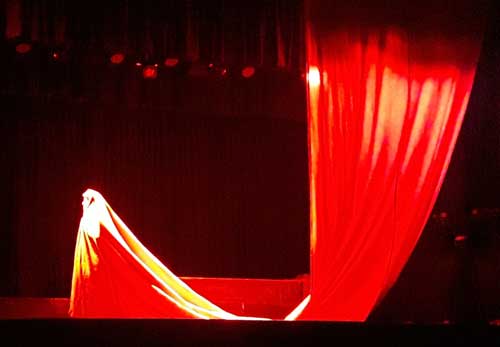
Finale of Farah Deen in her solo piece, “the Sky above, the Mud below” at the Colombo International Theatre Festival (photo: Ronald Rand)
How young were you when you began to dance and were your parents encouraging of you?
I started to dance when I was ten years old in elementary school. My first approach to dance was Austrian folk dance, which I really enjoyed in these traditional clothes called “Dirndl & Lederhosn.” Later on, I tried out many different dance styles and sports and my parents where always standing behind me. They came to every single performance to watch me.
However, I always had good grades in school and afterwards, I finished my ‘Bachelor in Law and Economics’ to please my Dad. He was the reason I never gave up on studies, even though dance took over my time and focus in life. Now that I am a full-time dancer, they are on the one hand side very proud, but on the other hand, they are worried if I earn enough money for my future family.
Of course, everything around the world has been turned upside down because the crisis. How have you dealt with everything and still stay on top of your work and in shape, preparing when you can again travel and perform? Are you currently working on a new piece?
The crisis is very tragical, but also brought a lot of peace to my body & mind. I finally had the time to refill my batteries after a very, very intense year of dance work in 2019, and the beginning of 2020. I was touring with ‘Hungry Sharks’ in Sweden with the solo piece, when the crisis started, and we had to break up the tour and fly home.
Now, after a good time of resting and recharging my energy, I am very much preparing myself now to stay in shape body-wise, but also I am already working on a new piece with my dance company, “Potpourri.” I am currently using the time to research on the ‘House Dance Culture,’ which has its origin in New York & Chicago. ‘House Dance’ and its culture has influenced my personal work since 2009.
My co-choreographer Olivia Mitterhuemer and I created a twenty-minute piece called
“Houseward Bound” in 2019, which we were supposed to perform in Alvin Ailey Theatre during the ‘Ladies of HipHop’ Festival in New York City in June 2020. Unfortunately, this performance was postponed due to the crisis, and therefore we’re using the time to make a full-length evening piece with a female-only cast. The premiere will be in March, 2021 in Vienna, Austria.
For those of us who are not that aware of the world of Hip-Hop, how would you describe its impact on our times – and what it means to you personally?
For me, the HipHop Community, which has spread all around the world gives me hope and strength – not only in these crazy times of the crisis. Within the dance scene we are all connected – even now, eventhough I am not able to cross boarders physically, I am still connected to a lot of dancers globally, who I share the same love with for the dance and the same mindset.
Wherever you travel, you can always find people who are part of the HipHop community and enjoy the same music, the same dance and have the same interests like you – and that’s what makes the community so strong to me. When I came to New York City in 2018 and 2019, I felt that that power of the community even stronger and fell even more in love with the culture.
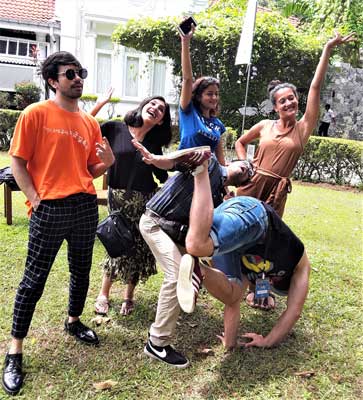
Farah Deen with students from the National University of Theatre and Film of Romania at the Colombo International Theatre Festival, Sri Lanka (photo: Ronald Rand)
What gives you the greatest joy being a dancer?
I feel like I can express things, which I normally wouldn’t dare to speak out loudly. I love to talk to people through my dance. It’s healing.
~~~~~~~~~~~~~~~~~~~~~~~~~~~~~~
Katy Lipson
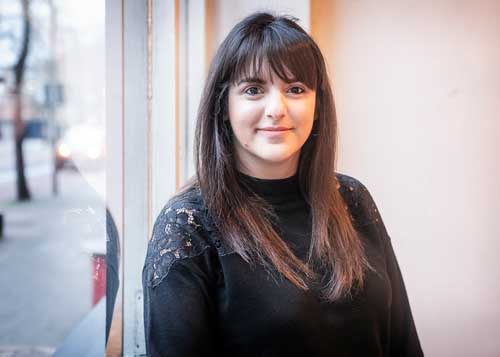
Aria Entertainment was founded in 2012 by Katy Lipson. In 2017, Katy was awarded the Best Producer award by the Off-West End Awards and is a recipient of a Stage One Bursary and Start Up Award. She took part in the first ever UK/US Producer Exchange in 2019, and was nominated for International Producer of The Year in 2020 by the League of Professional Women in New York. She made “The Stage 100” a list of the most influential people working in British Theatre in 2018, 2019 and 2020 for her work as producing artistic director of the Hope Mill Theatre. Ms. Lipson produced the UK Premiere Tour of The Addams Family in 2017 and the 50th Anniversary touring production of “HAIR: The Musical” in 2019, at the London Vaults in 2017 (Award-Best Off-West End Production-2018 WhatsOnStage Awards). She also co-produced the production with Hope Mill Theatre in 2016. Ms. Lipson had been the Producing Artistic Director at Hope Mill Theatre for all in-house musicals (2016-2019). Ms. Lipson transferred a production of “Pippin” to Southwark Playhouse (nominee-Off West End Awards), and her production of “Spring Awakening” (2019 WOS Award for Best Regional show). In 2012, the bicentenary year of Charles Dickens’ birth, she produced a revival of “The Mystery of Edwin Drood” at the Arts Theatre in the West End. In 2017, she produced “The Toxic Avenger” at the Arts Theatre, The Edinburgh Festival’s Pleasance Theatre and the Southwark Playhouse. Ms. Lipson created the ‘From Page to Stage Festival’ to support new musicals at all difference stages of development. In 6 years, the Festival gave over a hundred new musicals a platform. Over the years, Aria Entertainment productions also include: “Mame” (UK Tour) starring Tracie Bennett, “Unexpected Joy” (Southwark Playhouse and York Theatre, Off-Broadway), “It’s Only Life” (Union Theatre), “The Astonishing Times of Timothy Cratchit,” “Rags,” “Putting it Together,” “The Return of the Soldier, Pippin, Spring Awakening, Aspects of Love, Little Women, The ToyBoy Diaries,” “Yank!,” “Parade,” and “tick, tick…BOOM!” (Park Theatre), “Aspects of Love,” “Promises, Promises,” (Southwark Playhouse), “Vanities: The Musical” (Trafalgar Studios), “The House of Mirrors & Hearts” (Arcola Theatre), “See What I Wanna See” and “The Return Of The Soldier” (Jermyn Street Theatre), “Jerry’s Girls” and “Forever Plaid” (St. James Studio), “Bar Mitzvah Boy,” “That’s Jewish Entertainment,” “Bette Miller and Me,” “The Jewish Legends,” “The Great Jewish American Songbook” and “The MGM Story” (Upstairs at the Gatehouse and The Radlett Centre), “The Last 5 Years” (Southwark Playhouse), “Zorro The Musical,” “Sammy (Lyric Hammersmith), and “Elton John: It’s A Little Bit Funny” and “Jewish Hollywood” (Upstairs at the Gatehouse, The Radlett Centre.

You were nominated for International Producer of the Year in 2020 by the League of Professional Women in New York, and just became a nominee of the Guilder/Coigney Award – what does it personally mean to you?
I was absolutely delighted when I found out I had been nominated for this prestigious award. It was such an honour, and I am truly grateful for the recognition. It makes all the hard work worthwhile!
You have created an amazing body of productions that you’ve brought to audiences over the years ever since you began launching shows at The Fringe, and to the UK Premiere Tour of “The Addams Family” in 2017, the 50th Anniversary touring production of “HAIR: The Musical” in 2019, “Pippin” at the Southwark Playhouse, and your productions of “The Toxic Avenger” and “Spring Awakening.” Each of these powerful musicals tell basic human stories about longing for love, teenage sexuality, relationships and family – with everything going on, which direction do you think new musicals might consider going in?
I do think that we have to rely on the arts to do as much as it can to help change the world we live in. I am drawn to such a variety of musical voices in musical theatre, and I tend to produce shows I would enjoy watching too. I am confident new musicals will continue to push the boundaries of what can be told on stage. I am a big fan of the chamber musical; all the smaller forces on stage.
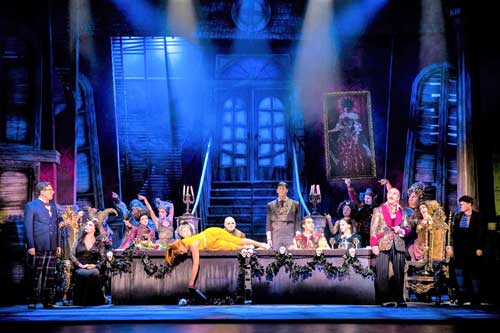
“The Addams Family”, Production by Katy Lipson and Aria Entertainment
It’s a challenging time now with the Theater shuttered across America, on Broadway and the West End and around the world – How have you been moving forward and building towards a new phase of new work for 2021-2022?
I spent the first four weeks in re-structuring the current shows I had on; both shutting down my productions of “Zorro” and “The Last 5 Years,” as well as trying to re-book another eight productions. I have spent the last eight weeks raising money to develop a few initiatives including recording new musicals and thinking about how and what I could produce in a socially distanced theatre. We’ve also been having conversations with distribution platforms for live capture.
What do you love the most about being a producer at this point and producing shows in London and around the world?
When you find a job you love and it feels right to you it helps you get up in the morning inspired; it makes you want to push the genre forward make new work and support artistes. It makes you want to connect the dots and make new connections. It’s passion and it should ever goes away.

Why do you feel musicals like Hamilton,” “Waitress” and “Evan Hanson” are especially relevant for today's audiences?
All these shows have brave new voices both musically and with the stories they are telling on stage. They say something in their own away about the world we live in; they bring things to the forefront which may have never been explored before; through its themes, messages, lead protagonists and storytelling devices. These shows capture the imagine of their audience and they become International.
How would describe what audiences are seeking from a new musical today?
They are looking for a new connection; just as we described above. They are looking to be blown away and connect with something on stage. They need to have an emotional response. The most successful shows allow that response to carry on weeks after the event itself, so the word of mouth helps create legacy for the show and a brand is created.
Have you had success with creating an exciting environment inside a theater for a musical piece, or is it more of a novelty?
I feel every show must create an atmosphere inside the theater if it can. The majority of my work has been on the off-West End stage, so I have been able to build the sets into the audience which helps create an environment so they have the greatest experience and a direct connection with the performers on stage.
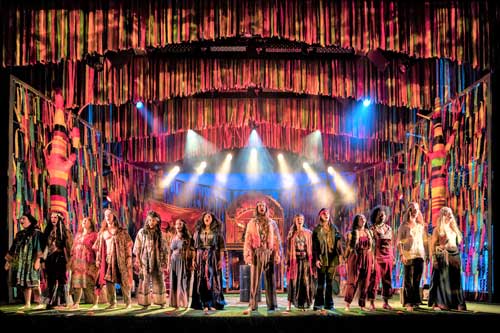
“HAIR: The Musical” Directed by Jonathan O’Boyle, production by Katy Lipson and Aria Entertainment
With “HAIR: The Musical” at the London Vaults, we wanted to bring the audience back to Woodstock in the 1960’s, and we knew this would allow great word of mouth as the experience would be so unique!
What gives you the greatest satisfaction being involved in theater and how it touches people’s lives?
I love bringing joy to audiences and opportunities to creatives and artistes both on and off the stage. I knew this was my calling around ten years ago and I have never looked back since. I watch closely peoples’ reactions after seeing my shows both in person and on social media; every single time it blows be away and I feel incredibly humble and lucky.
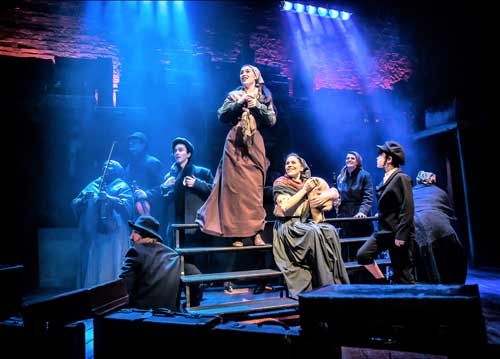
“RAGS: The Musical” Production by Katy Lipson and Aria Entertainment
You’ve said one of your ambitions is to create a new musical show from scratch? Why would that be most exciting for you?
I have always had an ambition to do something for the first time; whether that’s a European or UK Premiere of a new work or a show which hasn’t been seen in over fifty years or not seen in a particular city in that way; like our immersive production of “HAIR: The Musical.” So, the next step would be to realise a new musical from scratch! That is definitely my dream and would be the ultimate goal. And then I will set the next ambition; to do it all again!
~~~~~~~~~~~~~~~~~~~~~~~~~~~~~~
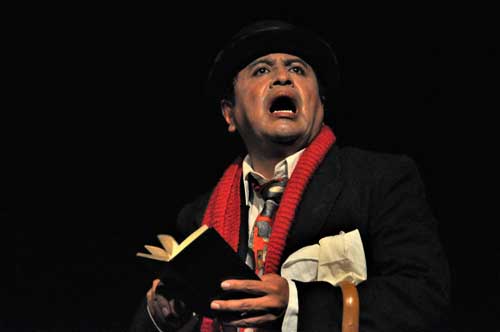
Juan Maldonado
Peruvian actor, solo performer, dancer and singer, Mr. Maldonado was a member of the theatre group, Cuatrotablas, founded by Mario Delgado. He worked with Mario Delgado on a one-man show, “Victor Humareda, a Black Orchid,” that became part of Cuatrotables’ “Four Characters.” It had its premiere at the Pilot Center and also appeared in San Isidro and Barranco. He also created the one-man shows: ““Guerra Loca” (Osama Lives) by Mexican playwright, Alejandro Licona, and “José María Arguedas Between Cantos y Cuentos,” a show with live music. He also worked with Hernando Cortés on two one-man shows, “Explanations to a Corporal of Service” by Julio Ramón Ribeyro, and “Castles in the Air.” He has performed his solo plays across Peru, in Venezuela, Colombia, Paraguay, Uruguay, Spain, Italy and France, twice to Argentina, seven times to Mexico, three times in Ecuador, and twice in Dominican Republic. Mr. Maldonado was part of theater groups at the University of San Marcos, El Tábano Theater, joined the Centro Perú Folklore Dance Company, and was also a director with them. He acted in “Histrión” with Carlos Velásquez, and at the Teatro del Sol with Luis Felipe Ormeño. Mr. Maldonado founded the theater group, Achalay Teatro. He joined Reynaldo D’ More's Lima Theater Club, and Hernando Cortés’ Teatro el Gadfly. He also became part of the University Theater of San Marcos (TUSM), performing at the Teatro el Tábano. Mr. Maldonado has appeared on soap operas, in several films and television shows including “Alias la Gringa,” “Patas del Alma,” “Tarata,” “El Mudo,” and Desaparecer, Maligno,” “Solitude,” “Storms of Passions,” “Dina Paucar,” and “Por la Sarita.”
Did you start performing at an early age?
I was born in the San Jerónimo de Tunan district, Huancayo province, Junín, Peru, the fourth of eight brothers. I arrived in Lima when I was the age of five, and entered primary school, the Instituto Pedagógico Nacional, and as children, we were expected to participate in school evenings, dancing different pictures of folklore and theater. But I didn’t get to participate during the first years which left a very large mark on me.
After I attended high school, the Colegio Nacional Nuestra Señora de Guadalupe, and then I took my university studies at UNMSM, Universidad Nacional Mayor de San Marcos. That’s where I was part of theater groups at the University of San Marcos, and at the El Tábano Theater and with Cuatrotablas.
At the University of San Marcos, I also joined the cast of dancers, Perú ’Centro Perú Folklore,’ and I also became a director. With the dance company, we performed at the Municipal Theater, Segura, Felipe Pardo and Aliaga, El Amauta, several others. We also appeared on various television shows, and went on tour across Peru.
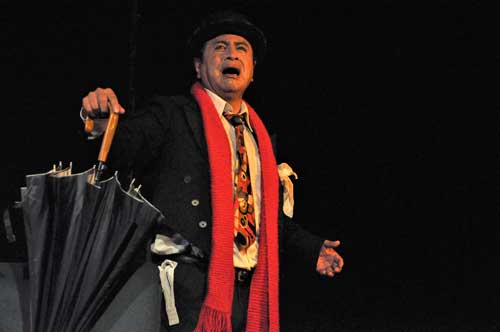
Did you know your path led to becoming an actor?
I was very shy; I really didn’t dance at parties or ceremonies, only with the other dancers in performances. But there was something I thought I might accomplish – to be an actor. When I first tried to join the group, Cuatrotablas, I didn’t have enough money at the time. A few years later, I finally was confident enough to enroll in a workshop with Houston Valdivia, Germán Vegas and Reynaldo Arenas.
Then a year later, I acted in “Histrión” with Carlos Velásquez and later at the Teatro del Sol with Luis Felipe Ormeño. When I finished my studies, I founded the group, , which in Quechua means ‘beautiful’ or ‘pretty’ That’s when I produced, directed and acted in productions, and also put on children’s shows.
So instead of pursuing dance, you continued as an actor?
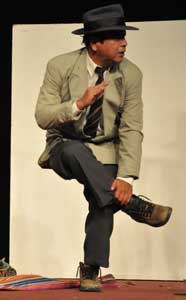 Yes, I joined Reynaldo D’ More’s Lima Theater Club, and met Hernando Cortés. He eventually invited me to join Teatro el Gadfly. I also became part of the University Theater of San Marcos (TUSM), acting in their productions with Hernando directing. After several years, I went to perform at the Teatro el Tábano, and then I acted on television, in film shorts and on soap operas.
Yes, I joined Reynaldo D’ More’s Lima Theater Club, and met Hernando Cortés. He eventually invited me to join Teatro el Gadfly. I also became part of the University Theater of San Marcos (TUSM), acting in their productions with Hernando directing. After several years, I went to perform at the Teatro el Tábano, and then I acted on television, in film shorts and on soap operas.
You also joined the theatre group, Cuatrotablas founded by Mario Delgado, who was considered one of the trailblazers of the New Peruvian Theatre. Cuatrotablas was the first in Peru to restage European classics by Sophocles, Shakespeare, and Brecht with Andean characters and themes. They collaborated with Grupo Cultural Yuyachkani, and with several important Latin American theatre leaders including Enrique Buenaventura, Santiago García, and Augusto Boal, producing theatre committed to social change that influenced Peru’s artistic community for almost fifty years.Delgado’s work with Cuatrotablas was influenced by Eugenio Barba’s anthropological theatre and Jerzy Grotowski’s Poor Theatre. Mario Delgado and Cuatrotablas helped organize El Taller Latinoamericano de Teatro de Grupos in Ayacucho. Mario Delgado and Cuatrotablas also established the “Tercer Teatro” (Third Theatre), performing far from the cultural capitals and centers. How did you become part of the prestigious group, Cuatrotablas?
After an event where the most important theater directors in the country met, I met Mario Delgado, and I was able to enroll in their workshops to begin my training process as an actor on the method work the Cuatrotables did as a group. I acted in the project “Arguedas, the suicide of a country,” a trilogy that premiered in 2006 at Fiteca. Then I appeared in a second production with Cuatrotablas in 2007, in the play, “En la Espesura de la Ciudad.”
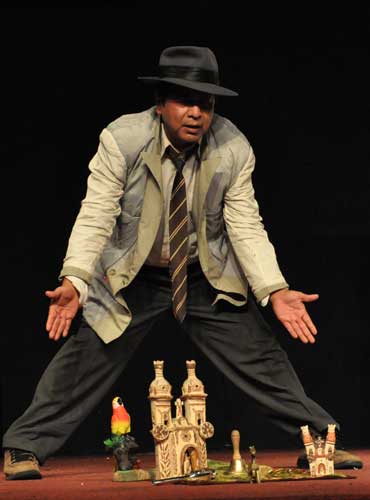
Juan Maldonado performing José María Arguedas, a Deep River” at Achalay Teatro
Is that around the time you began your own solo performance work?
I worked with Mario Delgado on “Victor Humareda, a Black Orchid,” that became part of Cuatrotables’ “Four Characters.” It had its premiere at the Pilot Center and also appeared in San Isidro and Barranco.
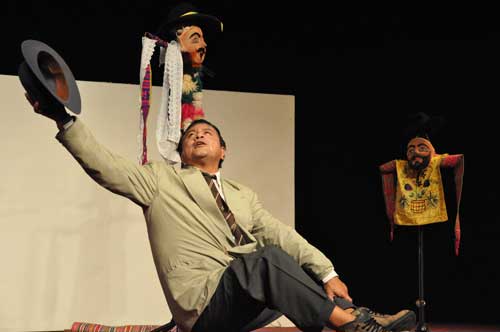
Juan Maldonado performing José María Arguedas, a Deep River” at Achalay Teatro
Then after spending six years in Cuatrotablas, I created my own one-man shows “José María Arguedas, A Deep River,” “Guerra Loca” (Osama Lives) by Mexican playwright, Alejandro Licona, “José María Arguedas Between Cantos y Cuentos,” a show with live music. I also worked with Hernando Cortés on two one-man shows, “Explanations to a Corporal of Service” by Julio Ramón Ribeyro, and “Castles in the Air.”
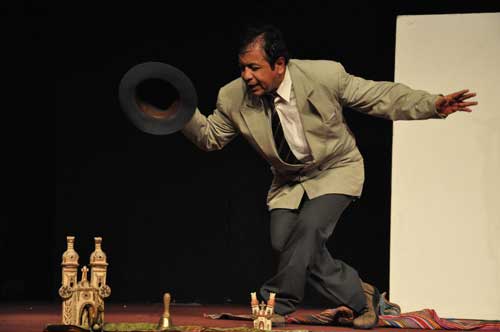
Juan Maldonado performing José María Arguedas, a Deep River” at Achalay Teatro
~~~~~~~~~~~~~~~~~~~~~~~~~~~~~~
Odile Gakire Katese
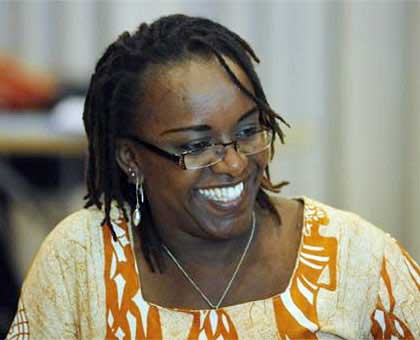
The Associate Director of the University Centre for Arts and Drama at the National University of Rwanda, she is also presently writing a screenplay about AIDS, as well as a novel that explores the lives of several Rwandan women. Known to her colleagues and friends as “Kiki,” Ms. Katese is a playwright, novelist, screenwriter, poet, drummer, and actress. To many in her homeland of Rwanda and in the international arts community, she is also a cultural revolutionary. Born in Rwanda, she fled with her family to the Congo during the genocide. She and her siblings were raised “in exile.” Educated in the Congo, she was not taught the language of the country of her birth, and for a time did not even know she was Rwandan. But Ms. Katese came to love her country, embraced her heritage, and undertook the job of building hope and happiness through art. She set out to create in Rwanda an artistic culture where there was little, to help a depressed and traumatized community find a reason to live again. Ms. Katese participated as the 2008 “Playwright in Residence” at Sundance Institute East Africa and as a director with “The Book of Lifeat the 2010 East Africa Theatre Lab. Her play, “Nwgino Ubeho” (“Come and Be Alive”) was also featured at the 2009 Theatre Lab. She received the Gilder/Coigney International Theatre Award, presented to her by Martha Coigney.
“You unfurl the wings of time and to both tips you tie all the threads that weave my name. You take a handful of the earth that covers me and infuse each speck with a breath of eternity…Every morning, I get up at dawn I search for you in the thick cotton fog. I turn every ray of sun upside down. Take my hand and let me pull you out of the dark abyss where you fall a little more every day. Yes, take my hand now.”
- Odile Gakire Katese, from “Ngwino Ubeho” (“Come and Be Alive”)with translation by Chantal Bilodeau
I had the pleasure of meeting Odile, and then corresponded with her and asked her how she learned about her country, how old she was when she returned to her country, and why she wanted to return? I also asked her how she began to learn about Rwanda, and how she went about building an artistic consciousness in her country.
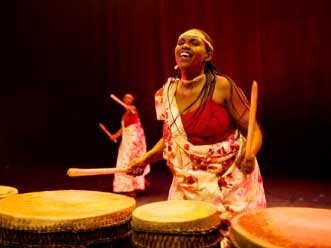 “I was born in exile,” she replied. “I was eighteen when someone on the road said to me: “What are you doing here when people are killing each other in your country?” I asked him: “My country? Which country” - and he said: “Rwanda.” That’s when I came to hear about the genocide in Rwanda. I was twenty when my family and I went back to Rwanda. We went back because my parents were longing to go back home, and it was finally possible. I didn’t know a lot of things about Rwanda beside the melancholic music that my parents used to listen to. My biggest regret is that I don’t know my mother tongue. I can’t write in Kinyarwanda. I write in French, and my work is translated in Kinyarwanda. When I went back to Rwanda, for a long time, I used to consider myself as a “zairoise” (Zaire) which I think I am to a certain extent. Therefore, I needed to own the history of Rwanda and the terrible legacy of the genocide. This process was only possible through artistic work as I was at the same time experiencing the power of culture. And it is through the University Centre for Arts and Drama of the National University of Rwanda that I started to offer images, symbols, emotions to reason and to the heart, to confront the violence of the genocide by increasing the number of spaces of poetical representation and intervention.”
“I was born in exile,” she replied. “I was eighteen when someone on the road said to me: “What are you doing here when people are killing each other in your country?” I asked him: “My country? Which country” - and he said: “Rwanda.” That’s when I came to hear about the genocide in Rwanda. I was twenty when my family and I went back to Rwanda. We went back because my parents were longing to go back home, and it was finally possible. I didn’t know a lot of things about Rwanda beside the melancholic music that my parents used to listen to. My biggest regret is that I don’t know my mother tongue. I can’t write in Kinyarwanda. I write in French, and my work is translated in Kinyarwanda. When I went back to Rwanda, for a long time, I used to consider myself as a “zairoise” (Zaire) which I think I am to a certain extent. Therefore, I needed to own the history of Rwanda and the terrible legacy of the genocide. This process was only possible through artistic work as I was at the same time experiencing the power of culture. And it is through the University Centre for Arts and Drama of the National University of Rwanda that I started to offer images, symbols, emotions to reason and to the heart, to confront the violence of the genocide by increasing the number of spaces of poetical representation and intervention.”
I then asked: What led her to write her play "Ngwino Ubeho" and how it was received?
“Since 2004, I’ve decided to work on the commemoration of the genocide every five years. In 2004, for the 10th commemoration of the genocide, I co-wrote the play “Iryo Nabonye” about what I saw that toured in villages in 2004, when I toured schools and universities in 2005, and at prisons in 2007.”
“For the 15th commemoration in 2009, I planned five artistic activities (a festival, a documentary film, a play, a book and a music album) on the theme of culture and conflicts. I’ve been able to implement four projects out of the five and “Ngwino Ubeho” (“Come to Life”) is one of them. “Ngwino Ubeho” is a play in loving memory of the dead that mixes dance, music and poetry. It tries to reconcile Rwandans with themselves, with happiness, with their history, with death, with the present and the future. It is an attempt to give life to the dead and to propose an appeased memory… It involved 15 Rwandan artists and an international artistic team (Togo/France, Burkina Faso, USA). Three performances were offered in Butare in Rwanda, Butare in 2009, and another three in Nantes, France in February, 2011. The premiere was in October, 2009 in Butare, at the Second Festival Arts in Azimuts. People in Butare and in Nantes were touched by our approach to the theme of the genocide. The quest of an appeased memory led us to find delicate choreographies, songs and words to soothe a little the pain and the despair related to the genocide and its legacy.”
I asked her about her being a part of the Sundance Institute in East Africa as a "playwright in Residence." Was it a rewarding experience and how did it feed her work as a writer, actress and director?
“Sundance East Africa started in Utah, and then went to Manda in July 2010 and 2011. Utah is a place of unique beauty, a place to be and the 2008 Theatre Lab was a life changing experience! Most of the time, what I need in my work and in my life are opportunities to renew my work and myself. Sundance worked as a unique chance to take distance from my routine and to look at my work with a new and different eye.”
“I always look fondly to my first visit to Utah when I met so many wonderful people! Working with American directors such as Rebecca Taichman and Mame Hunt was a great honor. Meeting with Jennie Dundas, an American actress and Co-Proprietress with Alexis Miesen of Blue Marble Ice Cream in Brooklyn prompted a very sweet journey: the launching in June 2010 of Inzozi Nziza, (Sweet Dreams), Rwanda’s first local ice cream shop with the women drummers of Ingoma Nshya.”
“The work of American artists I met in Utah in 2008, and in 2009 fed my imagination and my life. And in 2010, three Rwandan artists attended the first Theatre Lab in East Africa in Manda with the project “The Book of Life.” It’s crucial for me to sustain in the long run and I believe that “une chose n’a de sens que quand elle donne naissance”.
“Sundance East Africa transformed my life. Roberta Levitow, Philip Himberg, Christopher Hibma and Deborah Asiimwe make me stronger, hopeful and audacious in my work and contribute to strengthen the faith I have in life.”
I then asked why it is so vital to make this kind of art for the culture of Rwanda now.
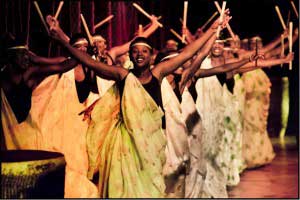 “Making art is vital in Rwanda for the same reasons it is everywhere. I agree with the Prince Claus Fund (Netherlands), one of the main partners in my work that “Culture is a basic need.” I also like these words of Pablo Picasso: “Art washes from the soul the dust of everyday life.”And for a country like Rwanda, a post-conflict society whose social tissue has been deeply destroyed, artistic tools help very much in the healing, reconciliation and peace building processes which require time and different approaches.”
“Making art is vital in Rwanda for the same reasons it is everywhere. I agree with the Prince Claus Fund (Netherlands), one of the main partners in my work that “Culture is a basic need.” I also like these words of Pablo Picasso: “Art washes from the soul the dust of everyday life.”And for a country like Rwanda, a post-conflict society whose social tissue has been deeply destroyed, artistic tools help very much in the healing, reconciliation and peace building processes which require time and different approaches.”
My next question was about being Associate Director of the University Centre for Arts and Drama at the National University of Rwanda and what she has learned from her students as she’s taught?
“The ingenuousness and freshness of students always amaze me. For the last ten years, I’ve been learning and experiencing the possibility of pulling up life from the emptiness, from nowhere. I’m always very alert when we start a project with just an idea and an empty stage. I like to watch how a play comes to life, how a costume, a light, a sound, a laugh, a word come to help us built a story. And I use the same process in my own life. In situation of impasse, I know that I have to be attentive and patient to pinpoint the element that comes to develop or not my project or my life. I pretend to know what is going to work or not, what is ready to happen or not…”
“I believe we need to increase and facilitate their access to artistic expression and experience. We need to be humble and honest in our work. We need to work hard and find the language they hear and are sensitive to. We need to never give up, no matter what.”
Odile has also written a screenplay about AIDS, and a novel about several Rwandan women. I wondered if she was seeing a re-birth of appreciation for art and culture in Rwanda.
“The appreciation of arts and culture has always been there. A sound of a drum can attract hundreds of people in a second. Rwandan people are hungry for spaces of joy, freedom and dreams. What we cruelly miss is a committed policy of culture to set up an appropriate environment for artistic and cultural activities to develop and sustain.”
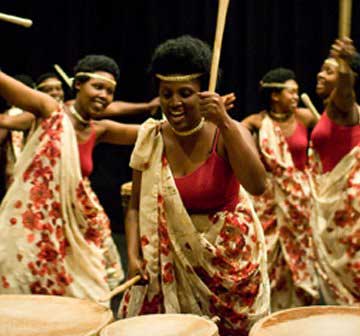
I finally asked what gives her the strength each day to wake up and want to bring art into the world.
“I take my strength from the conviction that art makes miracles and transcends our lives. The lives of hundred Rwandan women which have changed because they have touched a drum convince me of the necessity of bringing art into the world. And Art is the only language I speak to engage a conversation with the world.”
~~~~~~~~~~~~~~~~~~~~~~~~~~~~~~
Hartmut Von Lieres
Is a German composer and pianist. He has composed music for films and theater, including writing the music for the new opera, “IBSEN” with a libretto written by Ronald Rand.
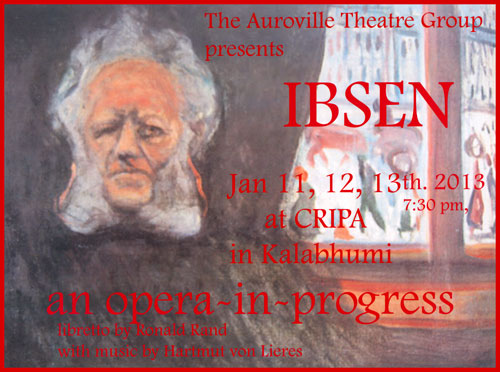
You recently had a concert in Auroville. Why did you want to come to India to perform your music?
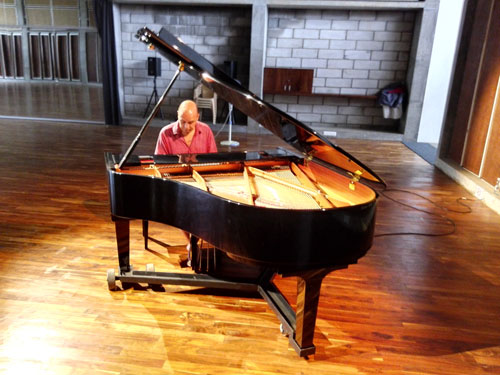
I have always been touched by classical Indian music. I had a very big longing for India. One day, I was in the airplane, on my way there.
How did it affect your music?
I’m more of a classically trained but I know about ragas. Sometimes it has seeped into my music. In the last concert I did here in Auroville, one song was called “Indian Dreams.”
How young were you when you took up the piano?
I was ten years old. My mother encouraged me. She placed a piano in the house and I had a teacher for twelve ears. He was a concert pianist Then after that, I studied the historical science of music.
What was some of the music you created in Germany?
I would give piano concerts in Germany with own compositions, mainly from the classical style. I’d call it impressionistic music of today.
The first Symphony I wrote was a commission about a castle and its environment. I had met some people here in India who liked my concerts, and they invited me to come to where they were near Bielefeld, in Germany. They had a water castle and their neighbor was a duchess. So I gave a concert there, and was commissioned by the duchess to write a symphony about this beautiful castle, Hueffe, near Bielefeld.
As I gazed at it, it began to inspire me. I had many historical guidelines from the duchess different historical chapters, which she thought were the most important for that area. The landscape there had faced Roman and Germanic periods. Then the Saxons came and fought against the Franks, then the Renaissance, and the Liberation wars from the Prussians against the French. I tried to include these historical elements into the music.
Which composers would you say are your biggest influences?

From the contemporary composers Steve Reich and Chick Corea. I like Reich‘s music; it’s extremely peaceful and he writes wonderful harmonies, which are quite meditationary without becoming boring. He’s an absolute master creating wonderful chords and harmonies. Chick Corea mixes classical orchestral music with Spanish music and jazz. Wonderful. I love it.
From the classical composers Stravinsky and Richard Strauss.
How were you first introduced to Ronald Rand to work together to create the music for the new opera, “IBSEN,” about Henrik Ibsen.
 Jill Navarre from the Auroville Theatre Group knew about my symphony and she liked it very much. She told me about a new play called “IBSEN,” and asked me to come and hear a reading of it in Auroville at her home. I went and met the playwright, Ronald Rand. Then Jill asked me if I would be interested in doing an opera. It’s the most challenging thing I’ve ever done, to express and underline the words with instruments. To express the big variety of human emotions with an orchestra.
Jill Navarre from the Auroville Theatre Group knew about my symphony and she liked it very much. She told me about a new play called “IBSEN,” and asked me to come and hear a reading of it in Auroville at her home. I went and met the playwright, Ronald Rand. Then Jill asked me if I would be interested in doing an opera. It’s the most challenging thing I’ve ever done, to express and underline the words with instruments. To express the big variety of human emotions with an orchestra.
Had you known much about Henrik Ibsen?
I knew who he was, but I didn’t know that much of his life and his work when I began. As I continued working, I became more and more fascinated by who he was and his work – he was a fascinating personality. I think he was extremely strong, and had a very lonely path like many men of size in the world. In a way, he was like Nietzsche. He wanted to create something new without any help.
It’s been very interesting to collaborate – it’s an international and intellectual exchange with Ronald. He’s in New York City, and I’ve been in Germany. Ronald’s someone who has studied deep into Ibsen’s life and it’s been enriching me.
I feel a lot responsibility to do a good job and want to make the opera happen. I believe there is an audience that would be very interested in an opera like this, that deals with the life of such a great artist, and Ronald has written a challenging libretto, so I can imagine, it would lead to a great discussion.
How did you go about creating the opera?
When I read the libretto, I begin to develop a ‘stage picture’ in my head of what happens there. The words, of course I follow and think: how do these characters feel. What is going on inside of them? I try to imagine, what is moving them.
I start with the voice, to create the melodic line. Then normally, the strings come, and they’re followed by the woodwinds, then the brass, harp, celesta and drums.
Then I read about Ibsen, his life and his plays to get a feeling for his life, the period and listened to music of his time. The opera has many influences from the late romantic period, mixed with modern elements regarding rhythm and harmonies. I did not want to write an opera of that time.
What are your hopes for the opera?
I hope it will go around the world, and that it will be a humanistic opera. In the opera there are all these different characters, several women, who have a strong connection to Ibsen, and have an influence upon him, and he upon them, which makes the encounters very dramatic.
I personally feel the opera would be very valuable for many people to see, including artists, to see how he struggles in his life creating his art. Women being liberated from the constraints of the time was a big issue for him and his work continues to have a great effect in many countries.
What makes music so valuable to our time today?
Can you think of the world without music? I think it transforms humans; music can be very unearthly. You can’t touch music; you can’t see it. It’s not earthbound.
When I think about Bach, for example, his spiritual music can make your heart soar. Music changes people, and so many different types of music creates so many different emotions.
Music can be a big educator – not only to express feelings, but also to bring the quality of compassion and love, courage and hope. Music is necessary for the health of all people.
~~~~~~~~~~~~~~~~~~~~~~~~~~~~~~
Dragan Jovičić
The celebrated actor, Dragan Jovičić, had led the celebrated Chamber Theatre 55 in Sarajevo, Bosnia & Herzegovina as its Artistic Director.
Recognized as one of the finest actors in the country with an array of leading roles on stage and in film, he has brought a great humanity and love in his role as Artistic Director, championing new plays and playwrights, leading with a refreshing and calm spirit and ease.
He has always worked to create an environment of harmony and joy, where those who work feel they can come and do their best. And it shows because the audiences who come and attend the array of plays always have a most fulfilling experience at one of the most important theaters in Europe.
The Chamber Theatre 55 remains one of the most productive and enjoyable theaters in Bosnia & Herzegovina. Many of their performances are sold out in advance, and the productions which Mr. Jovičić has chosen have thoroughly entertained and had a deep impact on the lives of those who have come to the Theatre.
Mr. Jovičić has said: “I believe it is all about creating the right atmosphere, finding a good text, a high-quality text, finding a good director, and making a good production. Though the modest means at our disposal, we continually try and increase the budget. All during the war we played. The performances were a special bond between us and the audience. The audiences would bring a candle to us as there were no electricity in the theater, and this was the only light for the audience to see us play. This is our profession and regardless of the situation, we have to preserve their dignity and the profession. Here at the theater, we have great young actors and we will endeavor to continue to invest in them and give them a chance, allowing them to show what they know and create space for their work. Young people want a chance. It’s important to me.”
The Shop around the Corner
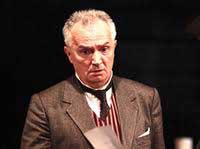 As an actor, his performances have been a huge part of the Chamber Theatre 55’s history, and he currently appears in Miklós László’s “The Shop Around the Corner” directed by François Lunel, and Abdulah Sidran’s “U Zvorniku Ja Sam Ostavio Svoje Srce” (“In Zvorkik I Left My Heart”) directed by Sulejman Kupusovic.
As an actor, his performances have been a huge part of the Chamber Theatre 55’s history, and he currently appears in Miklós László’s “The Shop Around the Corner” directed by François Lunel, and Abdulah Sidran’s “U Zvorniku Ja Sam Ostavio Svoje Srce” (“In Zvorkik I Left My Heart”) directed by Sulejman Kupusovic.
Mr. Jovičić also continues performing to standing ovations with internationally acclaimed actress Selma Alispahic, in its 12th year, the widely popular play, "Ay, Carmela" by Jose Sanchis Sinisterra, directed by Robert Raponja.
Among the Chamber Theater 55’s current repertory of plays also include “Umri Muški” starring Tatjana Šojić, Admir Glamočak and Senad Bašić. (playing for 23 years); “Koncert Ptica’ (The Concert of Birds) by Dževad Karahasan, directed by Aleš Kurt with Mirsad Tuka, Amar Selimović, Tatjana Šojić, Senad Alihodžić and Aida Bukva; Murray Schisgal’s “LUV” directed by Ronald Rand with Zana Marjanovic, Moamer Kasumović, and Muhamed Hadzovic; John Patrick Shanley’s “In Zvorkik I Left Your Heart” directed by Sulaiman Kupusović, “Doubt” by John Patrick Shanley directed by Selma Spahic; J. Pommerat’s “What We Have To” directed by Dino Mustafic; Majenburg’s “Stone” directed by Dino Mustafic; Ingmar Vilkvist’s “Helver Night” directed by Dino Mustafic, and A.Nikolaj “Die Hard” directed by Admir Glamočak, Mihanovic’s “Zaba” (“Frog”) directed by Elmir Jukic with Emir Hadzihafizbegovic, Mirsad Tuka, Moamer Kasumović, and Aleksander Seksan,
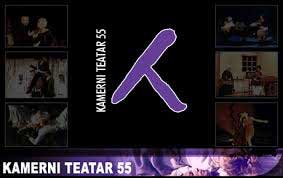 The Chamber Theatre 55 continues to have a permanent ensemble of 19 actors, and often hosts top local and international actors, directors, writers and artists.
The Chamber Theatre 55 continues to have a permanent ensemble of 19 actors, and often hosts top local and international actors, directors, writers and artists.
In September, 2013, Ronald Rand was invited to come to direct the comedy, “LUV” at the Chamber Theatre 55, and also performed his solo play, “LET IT BE ART!” Harold Clurman’s Life of Passion” at the Chamber Theatre 55 as part of the M.E.S.S. International Theatre Festival.
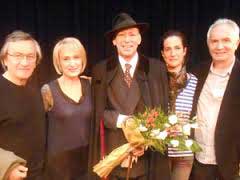
after performance at Chamber Theatre 55 in MESS International Theatre Festival - with renowned Bosnian painter Safet Zec, Mirjana Jovicic - translator of "LUV", Zana Marjanovic - acclaimed actress of Angelina Jolie's film "In the Land of Blood and Honey" and "LUV", and Dragan Jovicic - Artistic Director of Chamber Theatre 55, Sarajevo
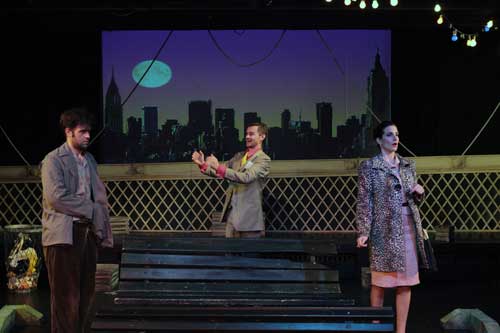
"LUV" directed by Ronald Rand, with Zana Marjanovic, Moamer Kasumović, and
Muhamed Hadzovic
The production of “LUV”, directed by Ronald Rand” continues to be performed by an extraordinary cast of Zana Marjanovic, Moamer Kasumović, and Muhamed Hadzovic. The hit production recently traveled on tour across Bosnia & Herzegovina and received standing ovations and awards at theaters and festivals in Slovenia and Montenegro.
It was a great privilege working with a gifted production team which included my Assistant Director Vedran Fajkovic, renowned Costume and Set Designer: Vanja Popovic, Translator of the original script: Mirjana Jovicic, Stage Manager: Sena Besic, Public Relations director: Duska Amidzic, Technical director: Mirsad Imamovic, Light designers: Elvedin Bajraktarevic & Nino Brutus, Sound designers: Edin Hajdarevic & Dina Hajdarevic, Scene Master: Milan Novic, Decorators: Ahmo Rozajac, Emir Pamuk & Samir Muhovic, Makeup artist: Jasmina Hadzic – Ajanovic, Wardrobe Mistress: Semra Didelija, Props Mistress: Mirela Gutric, Video Projector director: Dino Brutus, Cabinet master: Ramo Pamuk, with Hajdar Tinjak and Danan Jaha.
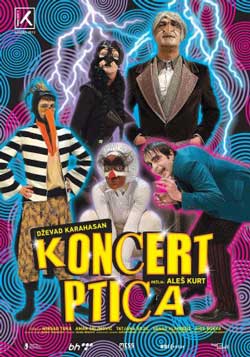 Founded in 1955, The Chamber Theatre 55 has had a long and illustrious history begun by its visionary founder Jurislav Korenić, at a time new drama was emerging in Europe, and many new works were performed at the theater including works by Beckett, Jarry, Pinter, Durenmatt, Genet, Camus, Sartre, Havel and Ionesco. The Chamber Theatre 55 had a decisive influence on a whole new generation of artists who came to see these plays in the unique theater space with the audience on three sides affording more of an intimate and sincere style of acting, much more direct and natural.
Founded in 1955, The Chamber Theatre 55 has had a long and illustrious history begun by its visionary founder Jurislav Korenić, at a time new drama was emerging in Europe, and many new works were performed at the theater including works by Beckett, Jarry, Pinter, Durenmatt, Genet, Camus, Sartre, Havel and Ionesco. The Chamber Theatre 55 had a decisive influence on a whole new generation of artists who came to see these plays in the unique theater space with the audience on three sides affording more of an intimate and sincere style of acting, much more direct and natural.
Over the years audiences have seen over 260 premieres including works by Brecht, Shaw, Witkiewitz, Albee, Alby, Schisgal, Weiss, Pirandello, Vitracq, Zindel, Goldoni, Lorca, Arbuzov, Fo, Bulgakov, Chekov, Dumas, Fassbinder, Ibsen, Strindberg, Dostoevsky, Priestley, Kohout, Shakespeare, Miller, Wise, Williams, Feydeau, Buchner, Glovatzky, as well as original plays written by Bosnian-Herzegovinian playwrights including Žalica, Topčić, Kovač, Plakalo, Ibrišimović, Fetahagić, Ovanović, Karahasan, Fogl, Mustajbašić, and Horozović.
And during the 1992-1995 war the Chamber Theatre 55 continued to present plays for its citizens and presented 28 premieres within their repertory that are described as “not succumbing to any compromise or any ideological, national, religious, or political influence.”

~~~~~~~~~~~~~~~~~~~~~~~~~~~~~~
Sachin Gupta
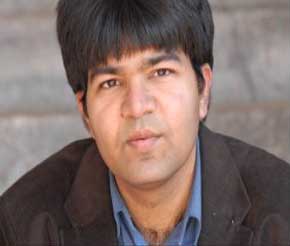 Recipient of India’s National Award “Natya Bhushan.” He is the founder and CEO of Chilsag Entertainment Network, and Chilsag Chillies Theatre Company, which has produced thirteen productions, written and directed by Sachin Gupta. He has formed a Theatre laboratory, a Drama Therapy Center, and has trained more than 300 actors in his Acting School at Chilsag Chilies Theatre Company, which he began in 2004. He has staged three plays Off-Broadway. In 2011, he formed Chilsag Motion Pictures, a film production house. He is presently directing a Bollywood Hindi feature film to be released in the winter of 2012. He is also the founder and editor of “Theatre Pasta, a magazine devoted to film and theater in India. Because of his achievements he has received positive letters from the former President of India, Dr. A.P.J. Abdul Kalam & an award conferred on him by Delhi’s Chief Minister Sheila Dikshit on behalf of Balwant Ray Society in India. Mr. Sachin’s plays include “Celebration of Life,” “Handicapped City,” and “Kailashnath weds Madhumati,” which he staged Off-Broadway and in Toronto. Recently he staged his play, “The Play Begins @8pm” in Orissa with film actor and singer, Vasundhara das. His other plays include “Suicide is Painless,” “Great Mind at Work,” “No Cheating Today,” “Don’t Miss my Party,” “Devil’s Carnival,” “Live Telecast,” “Next Indian Idol,” “A Roller Coaster Ride,” and “Wake Up Call.” Mr. Gupta studied at the Lee Strasberg Institute in New York City, Emerson College, and Fanshawe College in Canada. Chilsag@gmail.com, www.chilsag.com, www.theatrepasta.com
Recipient of India’s National Award “Natya Bhushan.” He is the founder and CEO of Chilsag Entertainment Network, and Chilsag Chillies Theatre Company, which has produced thirteen productions, written and directed by Sachin Gupta. He has formed a Theatre laboratory, a Drama Therapy Center, and has trained more than 300 actors in his Acting School at Chilsag Chilies Theatre Company, which he began in 2004. He has staged three plays Off-Broadway. In 2011, he formed Chilsag Motion Pictures, a film production house. He is presently directing a Bollywood Hindi feature film to be released in the winter of 2012. He is also the founder and editor of “Theatre Pasta, a magazine devoted to film and theater in India. Because of his achievements he has received positive letters from the former President of India, Dr. A.P.J. Abdul Kalam & an award conferred on him by Delhi’s Chief Minister Sheila Dikshit on behalf of Balwant Ray Society in India. Mr. Sachin’s plays include “Celebration of Life,” “Handicapped City,” and “Kailashnath weds Madhumati,” which he staged Off-Broadway and in Toronto. Recently he staged his play, “The Play Begins @8pm” in Orissa with film actor and singer, Vasundhara das. His other plays include “Suicide is Painless,” “Great Mind at Work,” “No Cheating Today,” “Don’t Miss my Party,” “Devil’s Carnival,” “Live Telecast,” “Next Indian Idol,” “A Roller Coaster Ride,” and “Wake Up Call.” Mr. Gupta studied at the Lee Strasberg Institute in New York City, Emerson College, and Fanshawe College in Canada. Chilsag@gmail.com, www.chilsag.com, www.theatrepasta.com
I had the privilege and pleasure to sit down with Sachin in New Delhi and first asked him how he began.
“I was about twelve years old in school here in New Delhi, when I did my first performance in a comedy,” he replied. “That was the seed and I started enjoying doing theatre in school. I would perform in the annual programs and events. When I was sixteen, I wrote my first play in school, a comedy. I acted in it but I never thought about directing. But soon I started doing all three. My mother would take my brother and I to the theatre.”
“When I finished school at seventeen, I took a professional engineering course for four years in college; I also did performance and was a part of theatre groups in New Delhi. Computer engineering was my main program and today I have my own IT company today. I do it now to keep my dream alive and fuel my passion.”
I asked him what led him to start his own theatre.
“In 2003, I started my own theatre company.” he told me. “I had left a job I had in '99. Then I got a job in the U.S. but I didn’t go to America. I had very clear objectives. I wanted to do a lot of theatre but I faced difficulties. I didn't have any idea how to start it. I had a lot of ideas to express but not a clue how to direct. I didn’t have a professional degree in theatre and directing.”
You’ve chosen to call your theatre – Chilsag Chillies.
“I chose the name because of nine elements: creative, humor, innovative, learners, sincere, successful, ambitions, explore, and to win. The French word: “gagner” means to win. There are all these nine elements, these qualities in any theatre person who is ambitious and a learner. I think we have to continually learn new things. At any age you can explore and discover all the energies you have. I also have all these nine elements in all my productions.”
I asked him about his acclaimed play, “Handicapped City.”
“When we staged the play in Delhi in 2004 we had standing ovations. I received an award from the chief minister of Delhi for the play. It was my second play. It’s about people in the city, a generation without a purpose and someone who wants to be successful and will do anything to get these things; it could happen in any place in the world. Everywhere you have these kinds of people. I think the city belongs to the people who live in that city. You can see your city is a city of artists like San Francisco. It’s about the kind of work that happens in the city and the positive and negative elements. The kind of work people does reflect their city and that country.”
I wondered what led him to want to direct his own plays.
“I didn’t have any professional training when I began,” he told me. “I did it my own way; I wanted to direct the actors to use the stage in an untraditional way, to use the entire auditorium and aisles so that became my strength. I like to have interaction with my audience. We should interact with the audience much more. In the play, “Kailashnath Weds Madhumati,” two people get married and the audiences are very involved with the festivities. I wanted to promote audiences when I started my theatre journey. I wanted to involve more people and give them opportunities. I also asked the actors in my company to write something on their own.”
“I want to share my experience as a teacher or director as much as possible. I think it’s important to share acting views from every country. Here in India I get a very good response. We have one of the best acting schools in India with intensive one and two year programs and we also teach the business of acting, scene study, building a character, and acting for camera. In my country I felt there’s a need for these programs for actors who want to come out on the weekend and study.”
I asked him about how he views the audience in India and what they want to see in the theatre.
“A lot of the things that people who come to see theatre have to do with the time they have. So we started doing short plays instead of plays for two hours. At least in 45 minutes they can see at least one play. Theatre must involve the audience and we must work to create a new audience. We need to experiment. I try to always have original productions, it’s all original work. I want to promote other playwrights.”
I then inquired about his theatre magazine, “Theatre Pasta,” and why he feel‘s necessary to share ideas from artists through it.
“I began my magazine, “Theatre Pasta,” because I felt that there isn’t enough support of theatre artists here so I want theatre artists to be known much more, to share about their theatrical journey. I wanted to talk about the artist – how they started, their struggles, how they make their art happen.”
“There are mainly positive reactions to the magazine, here and abroad. I strongly feel whatever you say becomes reality, and that theatre is the best thing in the world. “Theatre Pasta” is really India’s first specialized magazine about the artistic process. I had to start it. Now it’s mainly online. It gets a very good response. I want the artist in India to know about artists in Japan or in Australia or like what you’re doing in America with your Newspaper – to share ideas about theatre. It’s a common platform no matter the language. I wanted this community to be one community. One family as one community.”
“I also would like to have more exchange programs so people can come from different countries to India and study here with us. It’s my goal to start an intense two or three year residence program. It’s very intense work. For me, theatre is not a hobby; it’s a full time job. I feel an actor has to produce good quality work and the only way for that to happen is you have to devote your time and efforts, that’s what’s necessary.”
~~~~~~~~~~~~~~~~~~~~~~~~~~~~~~
Jill Navarre
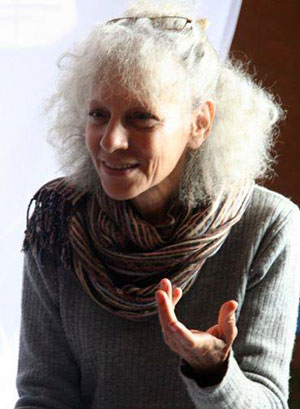 Has been the Artistic Director of The Auroville Theatre Group (ATG) in Auroville, Tamil Nadu, India since 1992. She has been directing many of their productions, with several actors beginning their stage careers with the ATG. Her career actually started in Washington, D.C. in the 1980’s, where she received Best Director award for “Rivers of Blood” at the Source Theatre Festival and first prize for her play, “The Cradle Will Fall” in the Washington, D.C. Arts Council competition. Jill was one of the founding members and the Director of the New Play Series at the Sanctuary Theatre, as well as working at The Folger Theatre. In New York, Jill worked at Playwrights Horizon, and the Light Opera of Manhattan. In America, other plays she has directed include “Resident Alien,” “The Greasy Envelope,” her play “The Cradle Will Fall,” “Deceit (Or Crime with Class),” “Psychotic Busboy Blues,” “Eeany-Meany,” her play “Mommy, I’m Home, and “Behind the Curtains.” In 2003, she began receiving Government of India Development Scheme grants with “Milarepa.” Her screenplays include “Portrait of Anna,” “The Door,” and “Sannyasi” with Edgar Weinberger –adapted from the novel – By the Body of the Earth or The Sannyasin by Satprem. In Auroville, some of the plays, Ms. Navarre has directed include “The Merchant of Venice,” “The Glass Menagerie,” “Waiting for Godot,” “Nishta: or The Strange Disappearance of Margaret Woodrow Wilson,” “Sacrifice,” “Milarepa,” “Rosencrantz and Guildenstern are Dead,” “The Rainmaker,” “The Tempest,” “The Woolgatherer,” “Black Comedy,” and “The Bay at Nice”, as well as new plays written by Aurovilians, such as “The Greedy Man” and “The Legend of the Kaliveli Siddha”. Her home base here has often been The Sri Aurobindo Auditorium in Bharat Nivas, where renowned Indian choreographers and directors such as Chandraleka and Veenapani Chawla, as well as Ronald Rand in his solo play, “LET IT BE ART! Harold Clurman’s Life of Passion” have performed new works. www.auroville.org/contents/3792, contact: jill.navarre@gmail.com, www.facebook.com/jill.navarre, www.facebook.com/theaurovilletheatregroup.com
Has been the Artistic Director of The Auroville Theatre Group (ATG) in Auroville, Tamil Nadu, India since 1992. She has been directing many of their productions, with several actors beginning their stage careers with the ATG. Her career actually started in Washington, D.C. in the 1980’s, where she received Best Director award for “Rivers of Blood” at the Source Theatre Festival and first prize for her play, “The Cradle Will Fall” in the Washington, D.C. Arts Council competition. Jill was one of the founding members and the Director of the New Play Series at the Sanctuary Theatre, as well as working at The Folger Theatre. In New York, Jill worked at Playwrights Horizon, and the Light Opera of Manhattan. In America, other plays she has directed include “Resident Alien,” “The Greasy Envelope,” her play “The Cradle Will Fall,” “Deceit (Or Crime with Class),” “Psychotic Busboy Blues,” “Eeany-Meany,” her play “Mommy, I’m Home, and “Behind the Curtains.” In 2003, she began receiving Government of India Development Scheme grants with “Milarepa.” Her screenplays include “Portrait of Anna,” “The Door,” and “Sannyasi” with Edgar Weinberger –adapted from the novel – By the Body of the Earth or The Sannyasin by Satprem. In Auroville, some of the plays, Ms. Navarre has directed include “The Merchant of Venice,” “The Glass Menagerie,” “Waiting for Godot,” “Nishta: or The Strange Disappearance of Margaret Woodrow Wilson,” “Sacrifice,” “Milarepa,” “Rosencrantz and Guildenstern are Dead,” “The Rainmaker,” “The Tempest,” “The Woolgatherer,” “Black Comedy,” and “The Bay at Nice”, as well as new plays written by Aurovilians, such as “The Greedy Man” and “The Legend of the Kaliveli Siddha”. Her home base here has often been The Sri Aurobindo Auditorium in Bharat Nivas, where renowned Indian choreographers and directors such as Chandraleka and Veenapani Chawla, as well as Ronald Rand in his solo play, “LET IT BE ART! Harold Clurman’s Life of Passion” have performed new works. www.auroville.org/contents/3792, contact: jill.navarre@gmail.com, www.facebook.com/jill.navarre, www.facebook.com/theaurovilletheatregroup.com
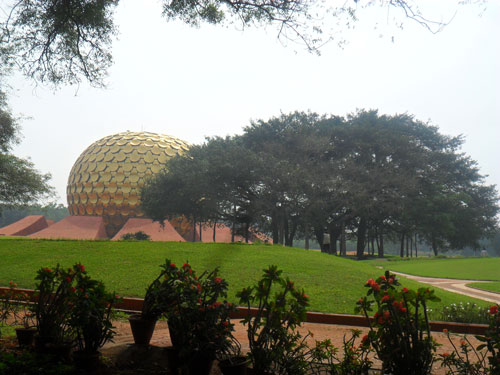
What brought you to Auroville?
Traveling to India for me began in ’87. At that time, I was working in Washington, D.C. with The Sanctuary Theatre and came with a friend to India. We stopped in a place in Tamil Nadu, and it was called Auroville. I was intrigue by this place. There were a bunch of people from all different countries trying to live and work together, understand one another. It was a kind of experiment in human unity; it had been a dream of mine when I was a child. I remember wanting to go to Israel too – the idea being a pioneer and establishing a place where people could live a different kind of life than the life we were living in America; it fascinated me.
I was born in New Orleans and grew up in Brooklyn. As a kid I loved to sing, and in summer camp got a chance to do some great roles like Ado Annie in “Oklahoma.” I started writing when I was about nine years old, and won a New York City-wide competition for best essay on the theme, “Why I Like to Read.” I also wrote poetry and had some of my poems have been published in the U.S. and in Canada. While I was living in Toronto, a group of us started a coffee house. We called it, ‘The Soft Cell,’ and presented some of Canada’s best poets for a solid evening of poetry and all the chocolate chip cookies you could eat.
My passion in life is theater. I’ve always been involved with the theatre and anywhere I go, I have to do theater or else I can’t live.
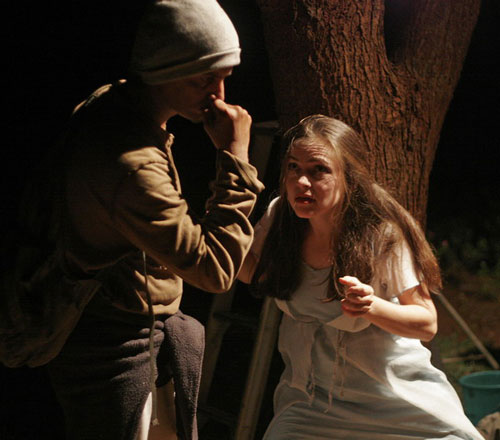
Hamlet performed in Auroville at the Town Hall with Drupad and Saraswati.
When I started to take my Master’s Degree at Florida International University, I took a playwriting class on a lark and that changed my life. I began writing plays with a wonderful instructor, Terry Twyman and then I got involved with theater in Miami. I worked for the Coconut Grove Playhouse. My first ‘paying gig’ in theater was selling tickets for “Ain’t Misbehavin’.” That was when I thought seriously about pursuing a life in the theater. So my partner and I decided to go to New York to get more involved with the theatre scene.
Well, when I first came here to Auroville, south India, I got in touch with people here who were doing theater, and I stayed in touch with them when I left. Then I decided to return in ’90. I told friends I’m just going to India for a year, but I didn’t come back to the U.S. for ten years.
What led you to directing?
I started to direct in Washington, D.C, and became a founding member with Michael Oliver and Elizabeth Bruce of The Sanctuary Theatre. I was also the director of the New Play Series where young playwrights would have a chance to see their work on stage performed for the first time and get some feedback from the audience. I was still writing plays and my play, “Mommy, I’m Home” got a production at the Washington Women’s Festival., When I began directing, I enjoyed it every much. I loved the fact we start with words on a page and at the end we have created a universe.
Why did you want to have your own theatre group here in Auroville?
I had found my ‘tribe’ and people in the States asked me: ‘Why are you staying in India,’” and the simplest reason that I could give was I felt happy here. When I arrived, there was no one else doing theatre in English, so I naturally jumped in.
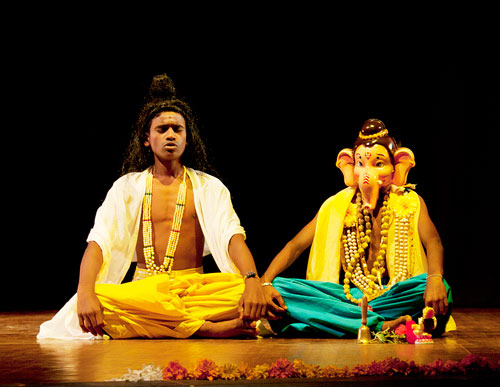
The scripts we’ve chosen are because of their beauty of language and depth of expression. We always ask the question: ‘What does this story mean to us, here, now?’
The plays we do have to have some relevance to the Auroville experience, its multi-cultural, international aspect and should be connected in some way to what Auroville is all about – an expression of the search for human unity, its triumphs as well as its failures, man’s aspiration for progress, the evolution of consciousness, unity in diversity, our connection with the Divine.
What is the credo of the Auroville Theatre Group?
Theatre is about transformation. It’s about finding yourself and touching the deepest part of yourself in order to offer it up to the Divine, to the audience. You are there for them – you’re enacting this miracle of transformation for them (some would say “we stand in their place.”)
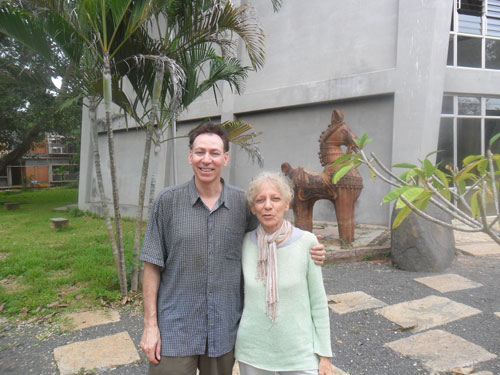
So how do we open our hearts to allow this transformation to take place? We use the strongest power that we know – the power of love. What is this love? It is the love which can change you, open you, widen you, clean you, make you strong. It gives you a voice, two arms, two legs, a strong, flexible, responsive, energized, dynamic body and most of all, a heart. It opens your heart, yes, until you think it will break.
During this work, every obstacle comes up, every resistance. We hear “It’s not possible.” “I can’t say that.” “I can’t do that.” “I can’t be that.” But we can. We contain multitudes. What is not possible is to do it alone. For this act of transformation, we need some help. We need each other, for support, for encouragement, for a kind word, for a hug. It’s not a mysterious process. And yet, it contains the essential mysterious question of life – how can love transform?
What is this power? Every day we come and start again. And every day there is some progress, understanding, some laughter and even some tears. Because you cannot change without pain, and frustration and denial and resistance. Then the love has to be there, even stronger than the strongest resistance. Because it leads to a discovery of one's psychic being, to a feeling of connectedness, of light and great, great joy. And we are here for that. I don’t mean only we have it in Auroville, but, finally, all of us are here – here on earth – to make it happen, to allow the spirit to work in the world and… we can do it. We must do it – together.
I think a theatre group in Auroville is like a small Auroville. We have to find a way to work together, to understand one another, to respect and trust one another. That is what Auroville is all about. When I direct I feel I’m in service to the ideals of Auroville. That appeals to me.
The dream of The Mother (whose vision created Auroville) was to create a place beyond national boundaries, religions, beyond differences of caste and gender. She asked people to join her in a great adventure, to step into the unknown, trusting that all who thirst for a higher and truer life are invited.
And somehow for me, this pursuit of a higher and truer life is the reason for doing theater also. It has to happen or I don’t do it. I’m not interested in repeating the past. When I take up a play I always ask myself – there’s always a question – How am I going to do this? If I don’t know the answer, then I know I’m on the right track. The process of discovery in rehearsal is very addictive, its magical. It’s very hard to describe. If I try I feel a lot of emotions. I think it’s a combination of working with all the actors and the play and here we’re all together to make a dream happen.
So, it’s about having a common purpose so we can bond together and trust one another, and at the same time it forces us to work for a certain perfection of expression which I have had not to elsewhere. In the United States a lot of people’s main focus is something other than achieving a quality of radiance. Here we don’t have to think about the money or the critics or worry about how we’ll will earn money. The money question is a big burden outside of Auroville. Here it doesn’t happen in a competitive spirit, so we can concentrate on creating something of truth and beauty without having to compromise ourselves for the bucks.
What kind of challenges do you encounter along the way?
Many challenges. I recall the line from Beckett’s play, “Endgame” – “You’re on earth, there’s no cure for that.” We’re all human beings; we all have our creative obstacles, our insecurities, our fears and these things get in the way of the freedom and the discipline we need.
What plays do like working on the most?
My first love, my deepest love is working on plays by Shakespeare. I’ve done four of his plays and part of a fifth one. “Hamlet, “The Tempest,” “Romeo and Juliet,” and “Merchant of Venice,” and stage-managed “Twelfth Night.”
Sri Aurobindo wrote extensively about Shakespeare and his place in dramatic literature. He wrote a book called The Future Poetry. The book means a great deal to me. In the book he wrote about Shakespeare, saying: “…in all literature, the one and genuine poet standing out as unique in his spirit, method and quality for his content…” was Shakespeare.
I feel Shakespeare, supported by what Aurobindo has said, is the finest work you can put on the stage and when you speak those words it does something to you. They have a mantric quality which takes you deeper, and higher than any other writing that I know of.

When you worked on your production of “Merchant of Venice,” what kind of research did you do?
I had to do a lot of research – about how Shylock was presented in the past, without letting this person, Shylock, overtake the play. So it was quite interesting to see videos of Sir Patrick Stewart, and Ian McKellan, and to listen to them talk about their work as Shylock, and then to try and see how my actor, Shakti Kumar, who would be playing Shylock, would find his way in. I spent five months working on “Merchant,” and nine months on “Hamlet.”
What questions did you personally ask yourself as you worked on the play?
I had to try to find, without prejudice, a balance between Shylock’s need for revenge which he speaks of over and over again, and his need for empathy. How will the audience empathize with him? How do we find a way to create understanding and identify with people who have suffered because of us? It’s a very difficult question. And I don’t know how much the audience listening to the play once or twice can understand immediately the balance. The message is important.
Why did you choose the plays you have chosen to do over the years in Auroville?
I look for the content or the message or whether it will be useful for my audience. There’s no use if the audience isn’t interested. With the audience in mind, I think about plays that have to do with spiritual awakening, the search for human unity, the struggle to remain true, searching for truth in your inner life. All these themes are interesting.
“The Rainmaker” by N. Richard Nash was the play we did in 2006, and the play explored some themes of love, trusting one’s self, learning how to be able to give and receive love, how to overcome fear. How to believe in the great magic that love brings in your life. The last scene when the rain comes is one of the magical moments of theater. You could feel the audience go “Ahhh!”
There was a play called “The Perfect Sandcastle” written by a young woman from England, Rachel Barnett. It came to me and this play offered an insight into how people who are lonely are able to reach across their loneliness, their separateness and listen to each other. To be present for each other. You have the character of a grandfather and a grandson, a mother and a daughter, and a young girl who is on a journey to find herself. Directing the play had been a joy, in the challenge. There was a little girl in the play, so I used two young actresses so neither one would feel burdened to carry the whole show by themselves; they were both delightful to work with.
You also are working with actors who speak different languages. Why do you enjoy the process as much as you do?
I find I can direct in another language. At first I was surprised when I went to Thailand and when I got there I found out the actors were not proficient enough in English to work on a play like “The Crucible,” so there had to be a Thai version which we used and I had to learn how to figure out what was happening on stage. To understand them I had to memorize the English script, and watch the action so I could sync my version with the version they were doing on stage.
Once you do it, you say – okay I can do it. And, fortunately working with the actors of the Moradokmai Company and The Rangakarmee actors in Kolkata, who perform in Hindi, I was working with dedicated young and older actors, people who were really in love with theater. And that was a great joy because they gave so much of their time and attention to the work. When you have that kind of devotion you can really make something happen.
You also bring many exciting artists from all over the world to perform and teach at Auroville. I had the good fortune of bringing my play as Harold Clurman to Auroville, which was an honor and a delight. Why is that important to you?
I feel we need to be inspired here by creative artists coming from all over the world. We need to be challenged out of our complacency. We need to constantly learn from artists from outside Auroville, to come and work with Auroville Theatre Group. It brings an element of surprise to the work. I also go out and direct in India and other countries. I take some people with me like when I worked in Thailand. I took two actors two times to work with the Moradokmai Theater troupe in Thailand. I worked on a play I wrote, a rock musical called “Peter Pan: Lost and Found,” and also worked on Arthur Miller’s “The Crucible.”
I feel it’s very important, this sharing of skills and being able to see new ways of working. Of course, India is very proud of its long tradition in the arts, and rightly so, and it’s also part of Asia and the influence of east Asian arts can be used to our advantage in our work; it’s a very interesting process. I found, for instance, with Moradokmai, there was a great respect and passion for theater from the students and the older actors. We could work at any time of the day or night if we had to. There was a respect given to the process and the time it needs, and of course as a director I love that.
What has happened to the community because of the work you’ve done here?
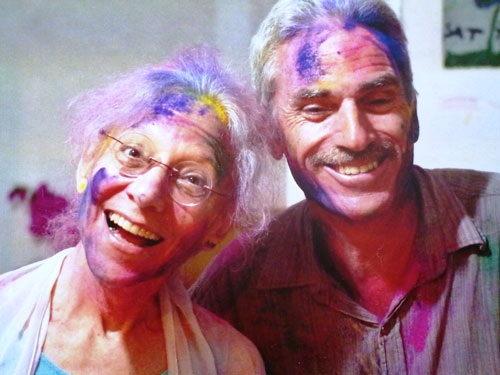
photo of me and Swar during a Hindu Spring Holi festival in Auroville, where it is mandatory that you get splashed with colored powder.
More young people are much more interested in acting. I’m not the only one doing theater here at Auroville. My role is only as one and there are others who work every day in the schools where plays are performed and the young people in Auroville have many opportunities to be on stage not just with the Auroville Theatre Group. There are performances directed by Johnny from Australia, there is a social satire by the Genius Brothers now, called Genius Inc. There’s work being done by Partha Krishnan, a wonderful actor, director, writer. Ellen, a German director has worked quite a bit with comedy, especially on Moliere and Giraudoux, and of course, Aryamani who has directed several plays by Sri Aurobindo.
People are also doing other things beside theater in Auroville. They have families to taken care of, they have their work. It’s very difficult to have a rehearsal schedule which can satisfy everyone. Very often I have to schedule according to the free time the actors have. One of our challenges here is that many of the actors do not have English as a first language, so we spend quite a few months, for instance, on how to speak Shakespeare. We keep reading the play together to understand the text, and I make sure the actors understand every word that they are saying. Sometimes they have to see a translation of the text in their native language and it takes time to compare the English text to Hindi or Tamil. It can take a lot time.
What do you feel your personal contribution has been to the lives of those here at Auroville?
I want to give respect to the creative process, to the input from every individual in the group. The work on a play involves the need for freedom and discipline. Without freedom you have fascism, without discipline you have chaos. So when working with a group, the group has to find the balance that allows them to work at their highest potential. I think the kind of work the Theatre Group has done has had an affect outside the theater.
In the same way in our daily lives we have to find a way to work together with those who may speak a different language. We come from another culture, and are embracing another life style and yet if we want to pursue a common purpose we have to allow space for each other’s uniqueness, each person’s gifts, each individual’s right to be heard and respected. And then of course, the director has to make the final decisions, so it can be challenging at time but I love what I do. Yes, every day, every moment.
~~~~~~~~~~~~~~~~~~~~~~~~~~~~~~









































